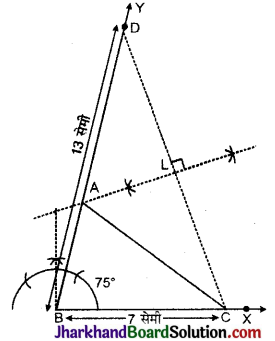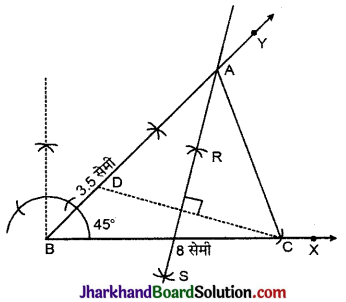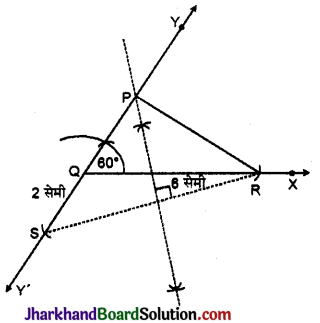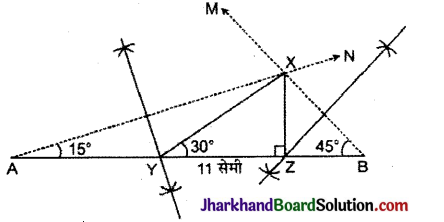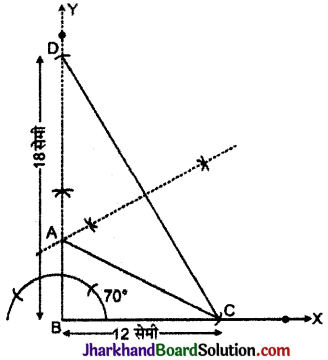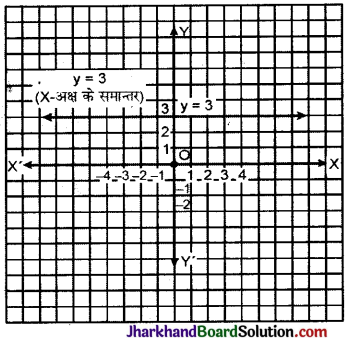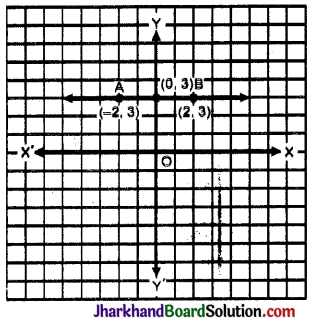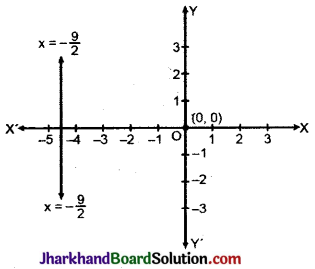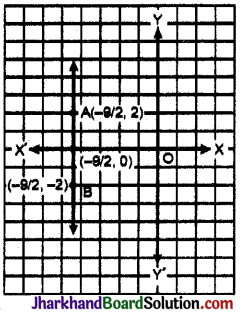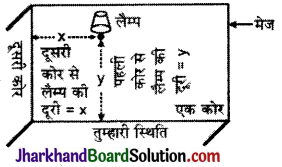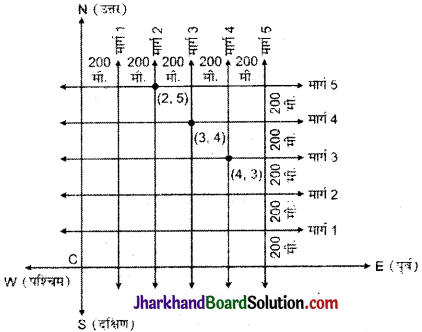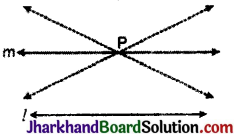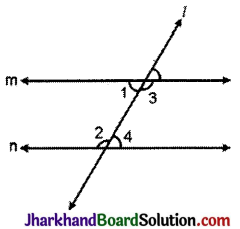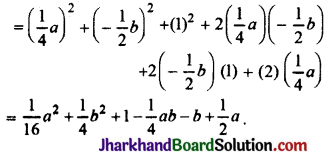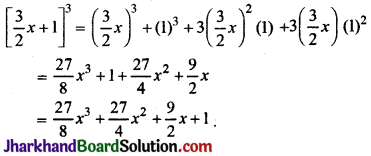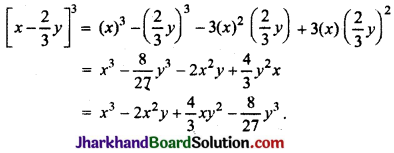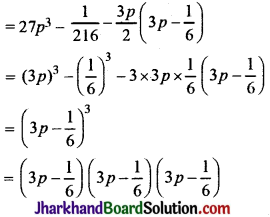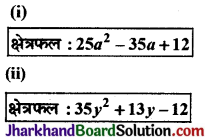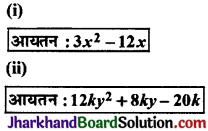Jharkhand Board JAC Class 9 English Solutions Grammar Tenses Questions and Answers.
JAC Board Class 9 English Grammar Tenses Exercises
Tenses का अध्ययन तभी सम्भव है जबकि एक वाक्य के विभिन्न भागों व उसके आदर्श प्रारूप का ज्ञान हमारे पास हो। ऐसा इसलिए है क्योंकि Tense (काल) विभिन्न प्रकार के वाक्यों के लिए कार्यक्षेत्र का कार्य करता है ।
अंग्रेजी के किसी भी साधारण व आदर्श वाक्य की रचना निम्न नियम पर आधारित होती है—
Subject (s) + Verb (v) + Complement (c)
उपर्युक्त प्रारूप ही अंग्रेजी भाषा का मूलाधार है। इसी प्रारूप अर्थात् नियम में विभिन्न परिवर्तन करके विभिन्न रचनाओं का निर्माण होता है ।
उपर्युक्त नियम की विभिन्न इकाइयों / अवयवों का ज्ञान होना अति आवश्यक है।
(1) Subject (कर्ता): A subject is the agency of conducting an action or the performer of an action. कर्ता किसी कार्य या गतिविधि को करने का माध्यम होता है या किसी कार्य का संपादन करने वाला कर्ता कहलाता है। सामान्यत: Noun (संज्ञा ), Pronoun (सर्वनाम) या Adjective (विशेषण) किसी क्रिया के कर्ता होते हैं। वचन की दृष्टि से कर्ता Singular या Plural हो सकता है। किसी वाक्य में कर्ता की भूमिका ठीक उसी तरह से होती है जैसे कि किसी परिवार में मुखिया की या किसी रेलगाड़ी में इंजन की। दूसरे शब्दों में, कर्ता वाक्य में प्रयुक्त होने वाली क्रिया या सहायक क्रिया का निर्धारण करता है। किसी भी वाक्य में क्रिया से “कौन” या “किसने” का प्रश्न करने पर उत्तर में जो प्राप्त होता है वही उस वाक्य की क्रिया का कर्ता होता है। यही प्रश्न अंग्रेजी में “Who” की सहायता से पूछा जाता है।
(2) Verb (क्रिया) : Those words which are symbolic of some action or moment are called verbs. किसी कार्य या गतिविधि के परिचायक शब्द क्रिया कहलाते हैं। किसी वाक्य से ” क्या करता है”, “क्या कर रहा” या “क्या किया” आदि प्रश्न करने पर उत्तर में जो प्राप्त हो वही किसी वाक्य का सबसे महत्त्वपूर्ण अंग होता है। बिना क्रिया के किसी भी वाक्य का अस्तित्व सम्भव नहीं है। क्रिया के सबसे महत्त्वपूर्ण होने का कारण इसका परिवर्तनशीलता (changeability) का गुण होता है। इसी गुण के कारण क्रिया का विभिन्न वाक्यों में विभिन्न रूपों में अस्तित्व सम्भव है। भाषा की उत्कृष्टता के लिए भी क्रिया का यही गुण जिम्मेदार होता है। Kinds of Verbs (क्रिया के प्रकार ) :
क्रियाओं को कई आधारों पर कई समूहों में बाँटा जा सकता है—

(1) Basis of Utility (उपयोगिता का आधार ) –क्रिया को उपयोगिता के आधार पर दो वर्गों में बाँटा जा सकता
(a) Main Verb (मुख्य क्रिया ) – Those action words which have both the individual meanings and identity are called main verbs. वे क्रिया – बोधक शब्द जिनके अपने व्यक्तिगत अर्थ व अस्तित्व हों, मुख्य क्रिया कहलाते हैं।
उदाहरण के लिए – Mohan climbed a tree. इस वाक्य में climbed का अर्थ ” चढ़ा” होता है और इसे वाक्य से बाहर लिखने पर भी उसका अर्थ नहीं बदलता है ।
(b) Helping Verb / Auxiliary (सहायक क्रिया) – Those words which in association with the main verbs provide a definite meaning and identification to the sentence are called helping verbs. वे शब्द जो मुख्य क्रियाओं के साथ मिलकर वाक्य को एक निश्चित अर्थ व पहचान प्रदान करते हैं सहायक क्रिया कहलाते हैं।
उदाहरण के लिए – Monika is reading a book.
इस वाक्य में is सहायक क्रिया है क्योंकि इसके कारण ही वाक्य के अन्त में ‘रही है’ जुड़ रहा है तथा यह बोध होता है कि यह वाक्य Present Continuous Tense का है।
(2) Basis of Object (कर्म का आधार ) – कर्म के आधार पर मुख्य क्रियाओं को दो भागों में बाँटा जा सकता है–
(a) Transitive Verb (सकर्मक क्रिया ) – Those main verbs which are accompanied with some direct or indirect object or which affect something directly or indirectly are called Transitive Verbs.
वे मुख्य क्रियाएँ जिनके साथ कोई प्रत्यक्ष या अप्रत्यक्ष कर्म जुड़ा हो या जिनका किसी पर कोई प्रत्यक्ष या अप्रत्यक्ष प्रभाव पड़ता हो, सकर्मक क्रियाएँ कहलाती हैं।
उदाहरण के लिए – Monika is reading a book.
इस वाक्य में is सहायक क्रिया है क्योंकि इसके कारण ही वाक्य के अन्त में ‘रही है’ जुड़ रहा है तथा यह बोध होता है कि यह वाक्य Present Continuous Tense का है।
(2) Basis of Object ( कर्म का आधार) – कर्म के आधार पर मुख्य क्रियाओं को दो भागों में बाँटा जा सकता है-
(a) Transitive Verb (सकर्मक क्रिया) -Those main verbs which are accompanied with some direct or indirect object or which affect something directly or indirectly are called Transitive Verbs.
वे मुख्य क्रियाएँ जिनके साथ कोई प्रत्यक्ष या अप्रत्यक्ष कर्म जुड़ा हो या जिनका किसी पर कोई प्रत्यक्ष या अप्रत्यक्ष प्रभाव पड़ता हो, सकर्मक क्रियाएँ कहलाती हैं।
उदाहरण के लिए –

उपरोक्त वाक्य में ‘killed’ verb है जो कि transitive है क्योंकि उसके साथ कर्म “Ravan” जुड़ा हुआ है। यदि हिन्दी के किसी वाक्य से ‘क्या ‘, ‘किसे’ या ‘ किसको’ का प्रश्न करने पर उत्तर में कुछ प्राप्त हो तो वह उस वाक्य की क्रिया का कर्म होता है। दूसरे शब्दों में हम कह सकते हैं कि उस वाक्य की क्रिया सकर्मक (transitive) है। यही प्रश्न अंग्रेजी में ‘what’ या ‘whom’ की सहायता से किया जा सकता है। What (क्या) के जवाब में Direct (प्रत्यक्ष) कर्म प्राप्त होता है। Whom (किसे, किसको) के जबाव में Indirect (अप्रत्यक्ष) कर्म प्राप्त होता है।
(b) Intransitive Verb (अकर्मक क्रिया) -Those verbs which are not accompanied with any object, whether direct or indirect, or the verbs which do not affect anything directly or indirectly, or the verbs whose effect is confined to the subject only are called Intransitive Verbs.
वे क्रियाएँ, जिनके साथ कोई प्रत्यक्ष या अप्रत्यक्ष कर्म न जुड़ा हो; या जिनका किसी पर कोई प्रत्यक्ष पर अप्रत्यक्ष प्रभाव न पड़ता हो; या जिनका प्रभाव सिर्फ कर्ता तक ही सीमित हो, अकर्मक क्रिया कहलाती हैं।

उदाहरण के लिए –

उपरोक्त वाक्य में ‘is laughing’ Intransitive Verb है क्योंकि उसके साथ कोई कर्म नहीं जुड़ा हुआ है। इस वाक्य से ‘What’ या ‘Whom’ का प्रश्न करने पर उत्तर में कुछ भी प्राप्त नहीं होता है।
(3) Basis of Strength (शक्ति का आधार) -शक्ति (रूप) के आधार पर मुख्य क्रियाएँ दो प्रकार की होती
(a) Strong Verbs (सबल क्रियाएँ) – वे क्रियाएँ, जिनके तीनों रूप वर्तनी (spellings) की दृष्टि से एक-दूसरे से एकदम भिन्न होते हैं, सबल क्रियाएँ कहलाती हैं। उदाहरण के लिए-
I form | II form | III form |
go
write
see
ride | went
wrote
saw
rode | go
write
see
ride |
(b) Weak Verbs (अबल क्रियाएँ) – अबल क्रियाओं से हमारा अभिप्राय ऐसी क्रियाओं से है जिनके दो या तीनों ही रूप वर्तनी की दृष्टि से एकदम समान हों। उदाहरण के लिए-
| I form | II form | III form |
Cut
shut
cast
read
wish | cut
shut
cast
read
wished | cut
shut
cast
read
wished |
Tense and Time
Tense Verb का वह रूप (Form) है जो Verb द्वारा व्यक्त कार्य अथवा अवस्था के समय का बोध कराता है। सरल शब्दों में, Tense एक निश्चित वाक्य रचना का आधार अर्थात् पृष्ठभूमि है।
Time (समय) एक सार्वभौमिक एवं सार्वकालिक भौतिक राशि (Physical Quantity) है। यह हमारे जीवन का अभिन्न अंग है जो सेकण्ड, मिनट, घण्टा, दिन, सप्ताह, महीना, वर्ष आदि रूपों में व्यक्त होता है। यह किन्हीं नियमों में बँधता नहीं है। अनन्त काल से एक-एक पल निरन्तर भागता रहने वाला समय (Time) अगम्य और अगोचर. है।
प्राय: देखा जाता है कि विद्यार्थी Tense और Time को एक ही अर्थ में ग्रहण करते हैं। एक ही वाक्य में Tense और Time अलग-अलग भी हो सकते हैं। इन्हें निम्नलिखित उदाहरणों से समझा जा सकता है :
1. The Prime Minister visited our city last week. — (Past Tense, Past Time)
2. The Prime Minister is visiting our city tomorrow. — (Present Tense, Future Time)
3. Abhishek has finished his work. — (Present Tense, Past Time)
4. Anurag is practising tennis these days. — (Present Tense, Present Time)
5. The sun rises in the east. — (Universal Truth)
Verb के मुख्यतः तीन रूप होते हैं :
1. Present Form या Base Form-इसे First Form भी कहते हैं।
2. Past Form—इसे Second Form भी कहते हैं।
3. Past Participle-यह Third Form के नाम से भी जाना जाता है।
इसके अतिरिक्त Present Participle तथा Infinitive भी Verb के दो अन्य रूप हैं।
यहाँ कुछ महत्त्वपूर्ण क्रियाओं के रूप दिये गये हैं। आप इन रूपों (Forms) को याद कीजिये।

List of Strong verbs
Group ‘A’
कुछ Strong Verbs जिनके Second और Third Forms, First Form के Vowel को बदलने से बनते हैं, –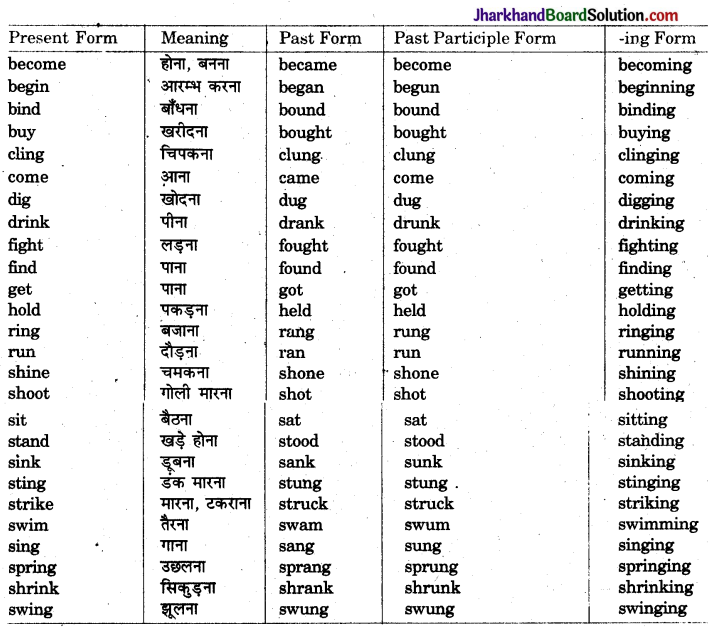
Group ‘B’
कुछ Strong Verbs के First Form (Present Form) में Vowel को बदलने से Past Form (Second Form) बनता है तथा First Form में ही en, ne या जोड़ने से Past Participle (Third Form) बनता है, जैसे-
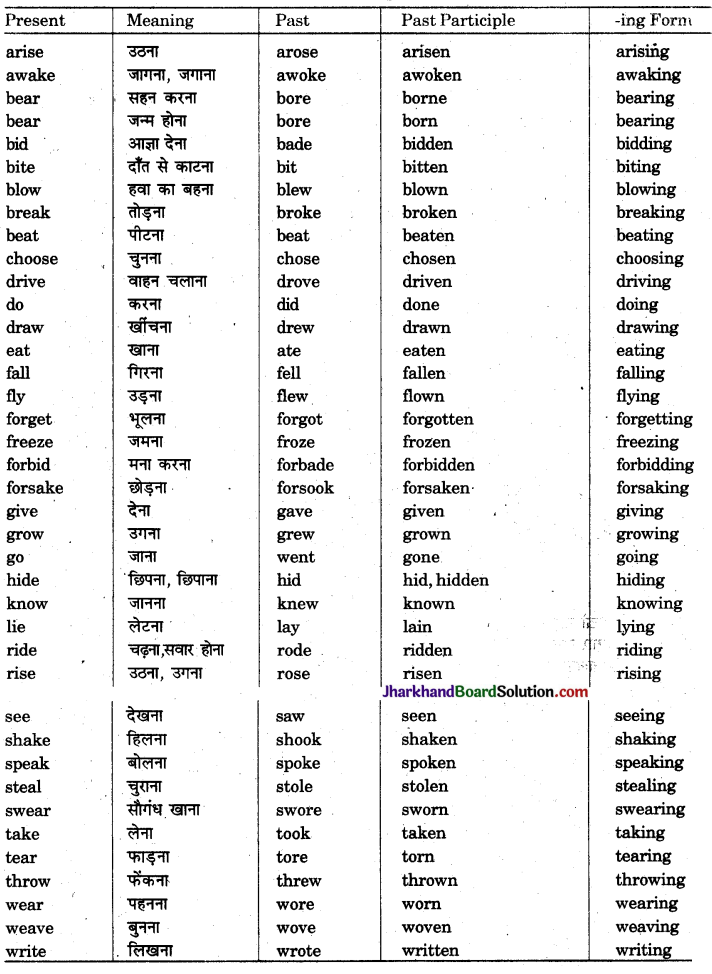

List of weak Verbs
Weak Verbs – ये वे Verbs हैं जिनके Second और Third Forms, First Form में d, ed या लगाने से बनते हैं।
Group – I
ऐसे Weak Verbs जिनके Second और Third Forms एक जैसे होते हैं। जैसे –
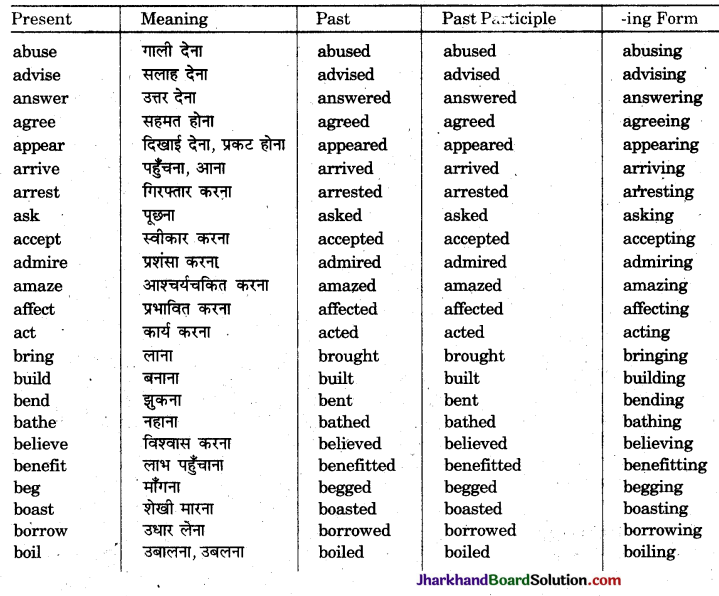
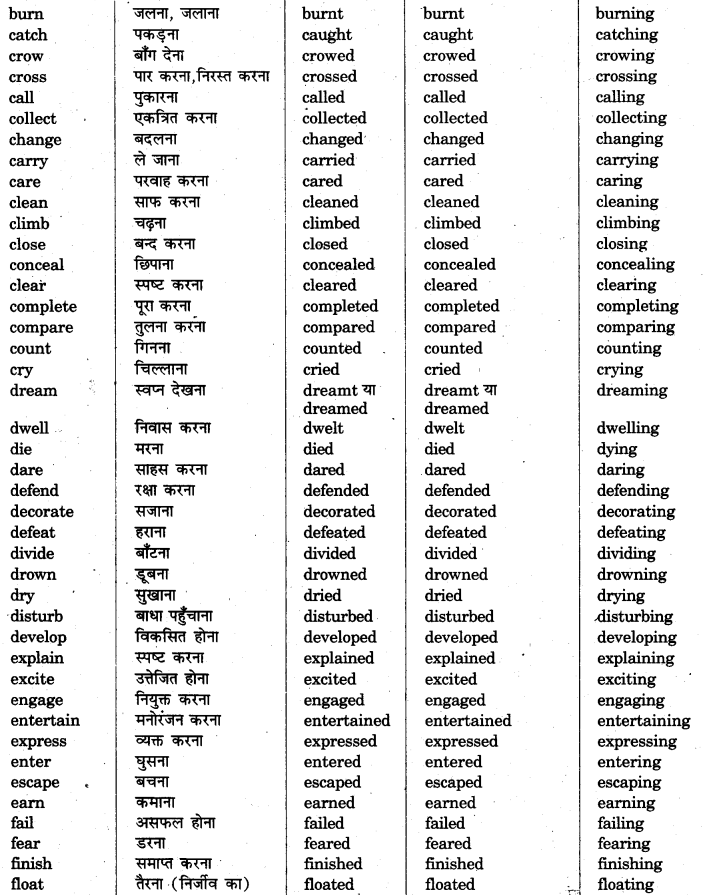

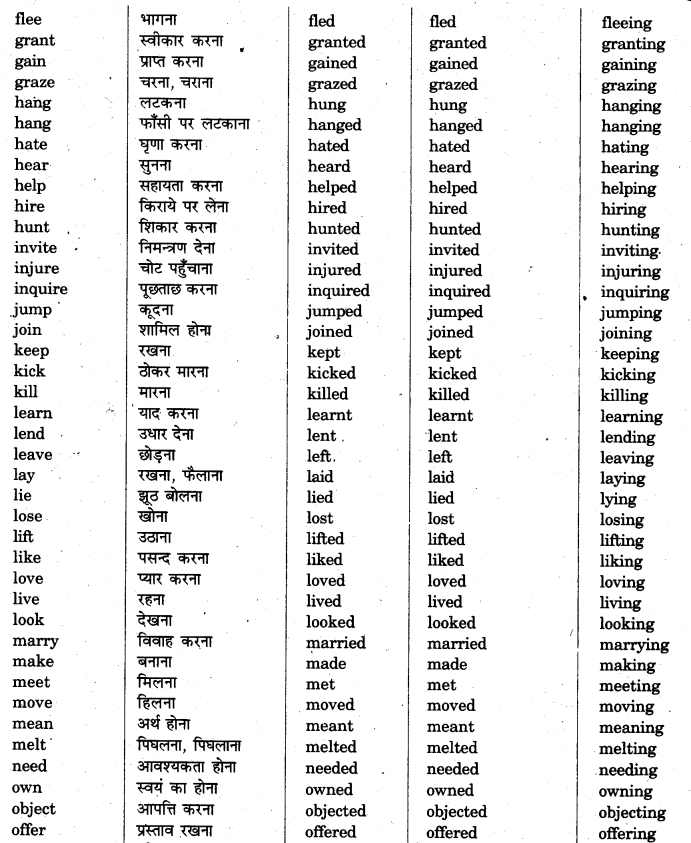

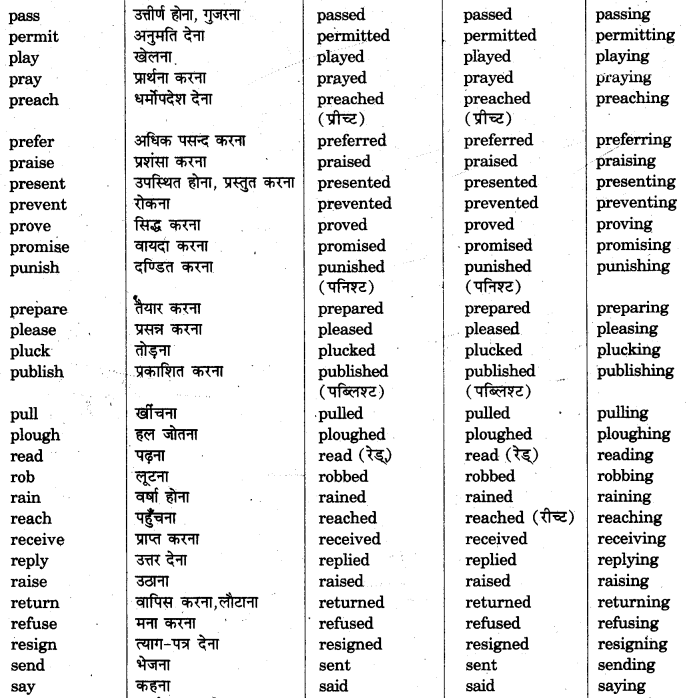
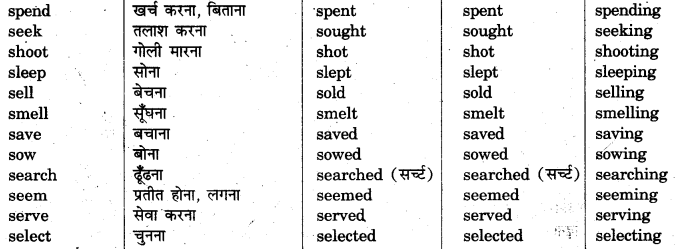
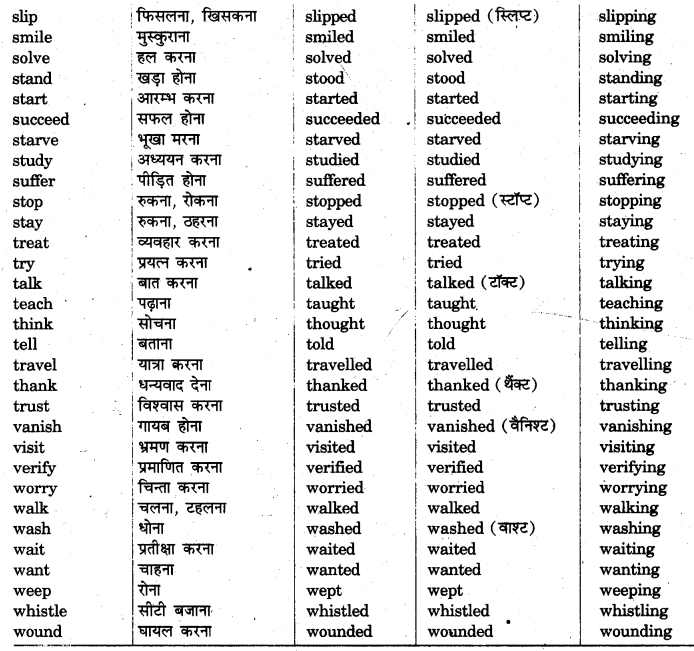

Group II
Note : निम्नलिखित क्रियाओं के तीनों Forms एक होते हैं-
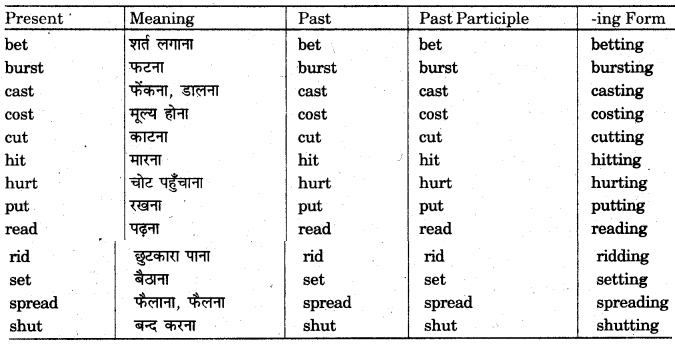
Group – III
Helping Verbs

अंग्रेजी में दो प्रकार के Tense होते हैं :
1. Present Tense (वर्तमान काल),
2. Past Tense (भूतकाल) । Future समय होता है जिसे विभिन्न प्रकार से व्यक्त किया जाता है।
एक ही Tense (काल) में Verb की भिन्न-भिन्न अवस्थाओं को व्यक्त करने के लिए प्रत्येक Tense के चार भेद होते हैं :
1. Indefinite,
2. Continuous (Progressive)
3. Perfect
4. Perfect Continuous
Present Tense
1. The Present Indefinite (Simple Present) Tense
इस Tense का प्रयोग वर्तमान समय में होने वाले कार्य, आदत, सामान्य अथवा शाशवत सत्य जैसी बातों का उल्लेख करने के लिए होता है।जैसे-
(1) He plays. वह खेलता है ।
(2) They play. वे खेलते हैं ।
(3) I play. मैं खेलता हूँ ।
(4) The sun rises in the east. सूर्य पूर्व में उगता है।
(A) Affirmative Sentences (स्वीकारात्मक वाक्य)
Pattern – Subject +V1/ V1+s/es …………………
1. मैं अपना पाठ याद करता हूँ। — I learn my lesson.
2. सीता एक मधुर गाना गाती है। — Sita sings a sweet song.
3. तुम एक पत्र लिखते हो। — You write a letter.
4. वे अपना पाठ याद करते हैं। — They learn their lesson.
Rule 1. Singular Number, Third Person कर्ता (He, She, It या कोई एकवचन नाम) के साथं verb में ‘ s ‘ यां ‘es’ लगा देते हैं। (देखिये वाक्य नं. 2)। किसी भी Noun Subject को Third Person समझना चाहिये।
Rule 2. Plural Number में Subject (We, They या कोई बहुवचन नाम) होने पर Verb भी Plural होगा अर्थात् verb में ‘ s ‘ या ‘es’ नहीं लगता है। (देखिये वाक्य नं. 4)
Rule 3. I और You के साथ verb में ‘s’ या ‘es’ नहीं आता है। (देखिये वाक्य नं. 1 और 3 )
Rule 4. हिन्दी के वाक्यों में अन्त में ‘ता’, ‘ते’, ‘ती’ के साथ अँग्रेजी में अनुवाद करते समय ‘is’, ‘am’, ‘are’ का प्रयोग नहीं होता है।
नोट – Third Person के Singular Subject के साथ प्रयुक्त होने वाले Verbs के स्राथ निम्नलिखित अवस्थाओं में -es जोड़ा जाता है :
(a) जिन Verbs के अन्त में ‘sh’, ‘ch’, ‘o’, ‘ss’, x ‘ अथवा ‘zz’ होता है, उसके साथ ‘-es’ लगाते हैं। जैसे:

(b) यदि Verbs के अन्त में हो व के पूर्व consonant (व्यंजन) हो तो हटाकर -ies लगाते हैं :
worry – worries
mid try – tries

(B) Negative Sentences (नकारात्मक वाक्य)
Pattern – Subject + do/does + not + V1
1. मैं अपना पाठ याद नहीं करता हूँ। — I do not learn my lesson.
2. वे हॉकी नहीं खेलते हैं। — They do not play hockey.
3. वह एक पत्र नहीं लिखता है। — He does not write a letter.
4. सीता एक मधुर गाना नहीं गाती है। — Sita does not sing a sweet song.
5. वह कभी झूठ नहीं बोलता है। — He never tells a lie.
Rule 1. Negative Sentences में एकवचन, third person कर्ता के साथ verb की first form के पहले does not का प्रयोग करते हैं तथा Verb की I form में s/es नहीं लगाते हैं। (देखिये वाक्य नं. 3 और 4)
Rule 2. बहुवचन noun कर्ता तथा I, you, we और they के साथ do not का प्रयोग करते हैं। (वाक्य नं. 1, 2)
Rule 3. अगर वाक्य में ‘कभी नहीं’ हो तो verb से पहले never लगाते हैं और do या does नहीं लगाते। (देखिये वाक्य नं. 5) 1
(C) Interrogative Sentences (प्रश्नवाचक वाक्य)
Pattern – Do/Does + subject +V1 …….. ?
1. क्या वह एक पुस्तक पढ़ता है ? — Does he read a book ?
2. क्या मैं तुम्हें एक कलम देता हूँ ? — Do I give you a pen ?
3. क्या तुम्हारी माँ तुमसे प्रेम करती है ? — Does your mother love you ?
4. वह यहाँ क्यों आती है ? — Why does she come here ?
5. तुम कौन-सी पुस्तक चाहते हो ? — Which book do you want?
6. तुम्हारे घर प्रतिदिन कौन आता है ? — Who comes to your house daily ?
7. क्या वह एक पत्र नहीं लिखती है ? — Does she not write a letter ?
8. कौन दूध पसन्द नहीं करंता है ? — Who does not like milk ?
Rule 1. Interrogative sentences में he, she, it और एकवचन के noun कर्ता के साथ Does वाक्य में Subject (कर्ता) से पहले ले आते हैं। Verb की पहली form लग़ाते हैं, ‘s’ या ‘es’ नहीं लगाते हैं। (देखिये वाक्य नं. 1 और 3)
Rule 2. I, we, you, they और बहुवचन noun कर्ता के साथ सबसे पहले Do, फिर कर्ता और फिर verb की पहली form लगाते हैं। (देखिये वाक्यं नं. 2)
Rule 3. अगर वाक्यों के बीच में कब, क्यों, कहाँ, क्या आदि प्रश्नवाचक शब्द हों तो सबसे पहले इनकी अंग्रेजी, फिर do या does और फिर कर्ता और फिर verb की पहली form आती है। (देखिये वाक्य नं 4)
Rule 4. कितना (How much), कितने (How many), कौन-सा (Which) के साथ उनसे सम्बन्धित Noun’s भी आते हैं। (देखिये वाक्य नं. 5)
Rule 5. अगर वाक्य में कोई प्रश्नवाचक शब्द ही कर्ता का कार्य कर रहा हो तो पहले उसकी अंग्रेजी, फिर verb लाते हैं। Who के साथ do, does का प्रयोग सहायक क्रिया की तरह नहीं होता है। (देखिये वाक्य नं. 6)
Rule 6. Interrogative negative वाक्य को Interrogative sentence की तरह बनाते हैं केवल कर्ता के पश्चात् not और लगा देते हैं। (देखिये वाक्य नं. 7)। इस तरह के वाक्यों में ‘Who’ (कौन) वाले वाक्यों में भी do या does लगाते हैं। (देखिये वाक्य नं. 8)
Rule 7. ‘वाक्य के अन्त में प्रश्नसूचक चिह्न (?) अवश्य लगाते हैं।
प्रयोग (Uses): इस Tense का प्रयोग निम्न अवस्थाओं में होता है-
1. शास्वत सत्य (universal truth) का भाव प्रकट करने के लिए –
(i) The sun rises in the east.
(ii) The earth moves round the sun.
2. स्थायी (permanent) कार्य अथवा स्वभाव का बोध कराने के लिए –
(i) We hear with our ears.
(ii) The rose smells sweet.
8. आदत (habit) का भाव प्रकट करने के लिए –
(i) He often comes late.
(ii) Hari never goes to office late.
4. समाचारपत्रों की headlines के लिए-
Two murderers escape.
5. आँखों देखे हाल का वर्णन करने के लिए-
When the door opens, many people enter the hall.
6. यात्रा संबंधी planned future के साथ होता है-
We leave for Jaipur at 8:00 and reach there at 9:00.
We stay there for two days and then leave for Kota.
7. इतिहास-प्रसिद्ध वर्तमान (Historic Present) का बोध कराने के लिए –
Now Akbar calls Birbal and asks…..
Note – इतिहास-प्रसिद्ध घटनाओं का अधिक स्पष्ट रूप से वर्णन करने के लिए Simple Present Tense के प्रयोग को ही Historic Present कहते हैं ।
8. Future के समय को प्रकट करने के लिए when के साथ Simple Present का प्रयोग होता है-
(i) I shall do it when he comes.
(ii) When I finish the letter, I will give it to you.
9. किसी भविष्यकालीन निश्चित कार्यक्रम के साथ जो किसी Time table के अनुसार हो। जैसे-
(i) The train leaves at 4:30 p.m.
(ii) Classes begin next Monday.
10. इसका प्रयोग Conditional Sentences के साथ भी होता है –
Pattern – If + Present Indefinite + Future Indefinite.
(i) If he comes to me, I shall help him.
(ii) If I see Kamal, I will tell him.
पहचान – जब किसी वाक्य में निम्नलिखित Adverbs का प्रयोग हो, तो उसे Present Indefinite या
Simple Present Tense समझना चाहिए-
(a) always, often, sometimes, usually, generally, frequently, seldom, rarely, never, regularly, daily, occasionally.
(b) every day/night/month/year etc.
(c) each day/night/month/ year etc.
(d) on Sundays/Mondays……
(e) in the mornings/evenings etc.
(f) once/twice a day/week/month etc.

(Present Indefinite Tense) with verb ‘write’
Chart of Simple Present
| Affirmative | Affirmative | Interrogative | Interrogative Negative |
I write.
We write.
You write.
They write.
He/She/Ram writes. | I write.
We write.
You write.
They write.
He/She/Ram writes. | Do I write?
Do we write?
Do you write?
Do they write?
Does he/she?
Ram write? | Do I not write ?
Do we not write ?
Do you not write?
Do they not write?
Does he/she/Ram not write? |
Exercise 1.
Fill in the blanks with the correct form of the verbs given in the brackets :
1. Ratan usually up at 4 o’clock in the morning …………….. (get)
2. They often to the movies …………… (go)
3. The sun in the west ………………….. (set)
4. Every mother ………….. her children affectionately. (love)
5. Neeraj …………………… games regularly in the morning. (play)
6. He ……………….. milk before going to bed. (take)
7. Birds usually ………………. nests in the trees. (make)
8. The Prime Minister ………………… to our town on Thursday next. (come)
9. Our brave soldiers always ………………….. watchful eyes on the border. (keep)
10. You sometimes ……………….. somewhat perturbed. (seem)
11. Lotus always ………………….. in mud. (bloom)
12. ……………… history ever …………….. itself? (repeat)
13. ……………… all teachers ……….. inspiration in the students? (infuse)
14. Two and two …………….. four. (make)
15. Our deeds …………………. our destiny. (determine)
Answer:
1. gets
2. go
3. sets
4. loves
5. plays
6. takes
7. make
8. comes
9. keep
10. seem
11. blooms
12. Does, repeat
13. Do, infuse
14. make/makes
15. determine.
2. The Present Continuous (Progressive) Tense
पहचान – हिन्दी में इस Tense के Sentences में ‘रहा हूँ’, ‘रही है’, ‘रहे हैं’, ‘हुआ है’, ‘हुई है’, ‘हुए हैं’ आदि शब्द आते हैं। वाक्यों से ज्ञात होता हैं कि कार्य चल रहा है और पूरा नहीं हुआ है। यह Tense is/am/are ‘ing form’ of the verb से बनता है। जैसे-
- I am playing.
- You are playing.
- He is playing.
- They are sitting.
(A) Affirmative (Positive) Sentences
Pattern – Subject + is/am/are + V1 (ing)…..
1. मोहन एक पत्र लिख रहा है।
Mohan is writing a letter.
2. लड़कियाँ स्कूल जा रही हैं।
The girls are going to school.
3. वह मैदान में दौड़ रहा है।
He is running in the field.
4. मैं एक गाना गा रहा हूँ। I am singing a song.
Rule 1. He, She, It और एकवचन subject के साथ ‘is’ लगाकर verb में ing लगाते हैं। (देखिये वाक्य नं. 1,3)
Rule 2. You, We, They और बहुवचन subject के साथ ‘are! लगाकर verb में ing लगाते हैं। (देखिये वाक्य 2)
Rule 3. I के साथ ‘am’ लराकर verb में ing लगाते हैं। (देखिये वाक्य नं 4)
(B) Negative Sentences
Pattern – Subject + is/am/are + not V1 (ing)…..
1. मैं एक पुस्तक नहीं पढ़ रहा हूँ। – I am not reading a book.
2. वह अपनी गुड़िया से नहीं खेल रही है। – She is not playing with her doll.
3. वे बाजार नहीं जा रहे हैं। – They are not going to the market.
Rule – not को is, are, am के ठीक बाद में रखते हैं।
(C) Interrogative Sentences
Pattern – Is/Am/Are + Subject + V1 (ing)….. ?
1. क्या लड़कियाँ कमरे में पढ़ रही हैं? – Are the girls reading in the room?
2. क्या सूर्य आकाश में निकल रहा है? – Is the sun rising in the sky?
3. क्या मैं एक पत्र नहीं लिख रहा हूँ? – Am I not writing a letter ?
4. क्या तुम आज स्कूल नहीं जां रहे हो ?- Are you not going to school today?
5. तुम वहाँ क्यों जा रहे हो ? – Why are you going there ?
6. वह अब किसकी पुस्तक पढ़ रहा है? – Whose book is he reading now ?
7. कितनी लड़कियाँ नाटक में भाग ले रही हैं? – How many girls are taking part in the play?
8. तुम्हारे नौकर को कौन पीट रहा है ? – Who is beating your servant?
Rule 1. अगर वाक्य के आरम्भ में ‘क्या’ हो तो Is, Am, Are कर्ता से पहले ले आते हैं और verb में ‘ing’ लगा देते हैं। (देखिये वाक्य नं. 1, 2)
Rule 2. अगर हिन्दी के वाक्य के बीच में प्रश्नवाचक शब्द हो तो उसकी अंग्रेजी सबसे पहले लाते हैं फिर is, are, am में से कर्ता के अनुसार लगाकर verb में ‘ing’ लगाते हैं। (देखिये वाक्य नं. 5)
Rule 3. How many, How much, Whose के साथ इनसे सम्बन्धित nouns भी लगाते हैं। (देखिये वाक्य नं. 6,7 ) वाक्य के अंत में प्रश्नवाचक चिह्न ( ?) लगाते हैं।

Rule 4. अगर प्रश्नवाचक शब्द ‘कौन’ ही कर्ता का कार्य कर रहा हो तो उसकी अंग्रेजी सबसे पहले लाते हैं। उसके बाद is, are, am में से एक subject के अनुसार लगाकर फिर verb की first form में ing लगाते हैं। (देखिये वाक्य नं. 8)
Rule 5. Negative Interrogative Sentences में मुख्य क्रिया से पहले ‘not’ और लगा देते हैं। (देखिये वाक्य नं. 3,4)
प्रयोग (Uses)
1. इसका प्रयोग ऐसे कायों के लिए होता है, जो वर्तमान में जारी हों । जैसे –
- I am writing letters.
- The child is weeping.
2. ऐसे कार्यों को बताने के लिए जो वर्तमान में चल रहे हों परन्तु यह आवश्यक नहीं है कि वे बोलते समय भी चल रहे हों। जैसे – I am learning English. (परन्तु यह आवश्यक नहीं है कि वह बोलते समय भी सीख रहा हो।)
3. इस Tense का प्रयोग पूर्व नियोजित कार्यक्रमों या कायों को व्यक्त करने में किया जाता है। भविष्य-काल का बोध कराने वाले शब्दों (tomorrow, next week आदि) का इस Tense के साथ प्रयोग होता है ।
जैसे – Hari is coming here next week.
पहचान – जब वाक्य में still, in the present time, at this time, at this moment, now-a-days, these days, this evening, now, today, at present आदि शब्द हों तो वह वाक्य सामान्यतः Present Continuous Tense में होता है ।
Verbs normally not used in ‘ing’ form
निम्नलिखित Verbs का प्रयोग सामान्यतया किसी भी Continuous Tenses में नहीं होता है :
1. Verbs of perception ( ज्ञानेन्द्रियों के अनुभवों को व्यक्त करने वाली क्रियाएँ) – see, hear, taste, feel, smell, notice, prefer, please, recall. उदाहरण-
(i) I see a picture. (Correct)
I am seeing a picture. (Incorrect)
(ii) I hear a song. (Correct)
I am hearing a song. (Incorrect)
Note – Hear के साथ ing का प्रयोग सुनने के भाव में नहीं होता अपितु सुनवाई के लिए होता है। जैसे-The judge is hearing the case. न्यायाधीश मुकदमे की सुनवाई कर रहे हैं।
2. Verbs showing feelings or state of mind (भावनाओं अथवा मस्तिष्क की अवस्थाओं को व्यक्त करने वाली क्रियाएँ)
want, wish, desire, like, dislike, believe, care, hate, love, hope, imagine, refuse, forgive आदि। उदाहरण-
(i) She believes in God. (Correct)
She is believing in God. (Incorrect)
(ii) I hate you. (Correct)
I am hating you. (Incorrect)
3. Verbs showing possession (प्रभुत्व या अधिकार प्रदर्शित करने वाली क्रियाएँ) – possess, own, belong to, have. उदाहरण-
(i) He possesses a vast area of land.
(ii) I have a dozen of horses.
Note – ज्ञानेन्द्रियों के अनुभव, भावनाओं या संवेगों को व्यक्त करने वाली कुछ क्रियाओं में जब -ing लगता है तो उनका अर्थ ही बदल जाता है। जैसे-
1. The doctor is seeing the patient. (see = जाँच करना) डॉक्टर मरीज की जाँच कर रहा है।
2. He is seeing me today. (see = मिलना) वह आज मुझसे मिलने वाला है।
3. Sita is seeing the town. (see = भ्रमण करना) सीता कस्बे का भ्रमण कर रही है।
4. The doctor is feeling the pulse of the patient. (feel = नब्ज गिनना) डॉक्टर रोगी की नब्ज गिन रहा है।
Verbs के अन्त में -ing लगाने के नियम
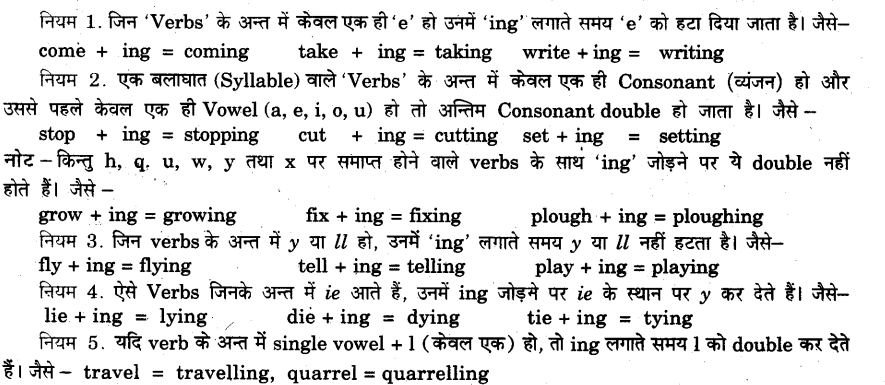
Exercise 2.
Fill in the blanks with the correct form of the verbs given in the brackets :
1. My father wears dhoti and kurta daily but he………….. a white suit today. (wear)
2. She ……… in her bed now. (sleep)
3. The sun behind the clouds now. (hide)
4. Suresh …………….. a lot these days. (earn)
5. The Education Minister……….this place next week. (visit)
6. She………clothes at this time. (wash)
7. My younger brothers …………… a factory these days. (run).
8. Look there! They ………. towards us. (come)
9. My mother ……………. food at this moment. (cook)
10. Yes, the match …………. on and you can watch it on any TV. (go)
Answer:
1. is wearing
2. is sleeping
3. is hiding
4. is earning
5. is visiting
6. is washing
7. are running,
8. are coming
9. is cooking
10. is going.
Exercise 3.
Fill in the blanks with the correct form of the verbs given in the brackets :
1. The schools never. on Sundays but they… today. (open)
2. Ganpat usually …….. at the front of the class, but today he ………. in the last row. (sit)
3. Ravi …….. only newspapers, but this week he ……. magazines as well. (sell)
4. I usually …………….. coffee but today I …………….. milk. (drink)
5. I generally by …………….. bus but tomorrow I in Kamal’s car. (go)
6. I …………….. football on Saturdays. (play)
7. I …………….. English at school 2 hours a week. (learn)
Answer:
1. open, are opening
2. sits, is sitting
3. sells, is selling
4. drink, am drinking
5. go, am going
6. play
7. learn.
3. Present Perfect Tense
इस Tense के वाक्यों में काम का वर्तमान काल में पूरा हो जाना पाया जाता है और वाक्यों के अन्त में ‘चुका है’, ‘चुकी है’, या ‘आ है, ई है, ये हैं’ आदि शब्द आते हैं।
(A) Affirmative Sentences
Pattern – Subject + has/have + V3 …………….
1. राम स्कूल जा चुका है / गया है। — Ram has gone to school.
2. मैंने उसको एक पत्र भेजा है। — I have sent a letter to him.
3. तुमने उसकी प्लेट तोड़ दी है। — You have broken his plate.
4. उसने एक सौंप देखा है। — He has seen a snake.
Rule – He, She, It और एकवचन कर्ता के साथ has और I, You, We, They तथा plural subject के साथ have लगाकर verb की third form लगाते हैं।
(B) Negative Senatences
Pattern – Subject + has/have + not + V3 …………….
1. उसने गाना नहीं गाया है। — She (या He) has not sung a song.
2. मैंने तुम्हारा पत्र नहीं पढ़ा है। — I have not read your letter.
3. हमने ऐसा जानवर नहीं देखा है। — We have not seen such an animal.
Rule – Negative sentences में has या have के बाद not लगाते हैं।
(C) Interrogative Sentences
Pattern – Has/Have + Subject
1. क्या उसने अपनी गाय बेच दी है ? — Has he sold his cow ?
2. क्या तुमने अपना पाठ याद कर लिया है ? — Have you learnt your lesson ?
3. क्या मैंने एक चोर नहीं पकड़ा है ? — Have I not caught a thief?
4. कितने लड़के आज आये हैं ? — How many boys have come today?
5. कौन अपनी पुस्तक नहीं लाया है? — Who has not brought his book ?
6. लड़का कहाँ भाग गया है ? — Where has the boy run away?
Rule 1. यदि वाक्य प्रश्नसूचक शब्द ‘क्या’ से आरम्भ हुआ हो तो सबसे पहले Has या Have लगाते हैं और उसके बाद subject, फिर क्रिया की third form और अन्त में कर्म आदि आते हैं। (देखें उदाहरण 1, 2)
Rule 2. अगर वाक्य के बीच में प्रश्नसूचक शब्द दिया हो तो उसकी अँग्रेजी सबसे पहले लगाते हैं, फिर has या have, फिर कर्ता, फिर verb की third form लागते हैं। (देखें उदाहरण 6)
Rule 3. Negative Interrogative Sentences में subject के पश्चात् not लगा देते हैं। (उदाहरण 3 ) प्रयोग (Cses?
1. हिन्दी के वाक्यों के अन्त में ‘चुका है’, ‘चुके हैं’, ‘दिया है’, ‘लिया है’ आदि शब्द आते हैं । इस Tense का प्रयोग ऐसे कार्य के लिए होता है, जो अभी हाल में ही समाप्त हुआ है। ऐसे में हम बहुधा just, recently, already का प्रयोग करते हैं। जैसे –
(i) He has just gone out. वह अभी-अभी बाहर गया है।
(ii) He has alroad, explained his problem to me, वह पहले ही मुझे अपनी समस्या बता चुका है।
नोट – just का प्रयोग Helping Verb व Main Verb के बीच किया जाता है।
2. इसका प्रयोग ऐसे कार्य के लिए भी होता है, जो भूतकाल में आरम्भ हुआ हो और अब भी जारी हो। इसके साथ प्राय: for और since का प्रयोग होता है। जैसे –
(i) He has been here for two weeks. यह दो सप्ताह से यहीं है। (और अब भी वहीं है।)
(ii) Mr Sharma has lived in Jaipur since 2015. शर्मा जी 2015 से जयपुर में रहते हैं। (और अब भी वहीं हैं।)
3. इस Tense का प्रयोग उन कार्यौ के लिए भी होता है, जो भूतकाल में पूरे हो गये हैं पर उनका प्रभाव वर्तमान समय में भी दिखाई देता है।जैसे –
(i) He has cut his finger. उसने अपनी उँगली काट ली है। (अभी भी खून बह रहा है।)
(ii) The Chetak Express has arrived. चेतक एक्सप्रेस आ चुकी है। (और अभी भी प्लेटफॉर्म पर है।)
4. ऐसे कार्यों को बताने के लिए जो बोलते समय ही समाप्त हुए हों।
(i) I haven’t seen you for ages. (लेकिन अब तुम्हें देख लिया है।)
(ii) She hasn’t taken food for two days. (अब वह खा रही है।)

5. इसका प्रयोग ऐसे भूतकालीन कार्यों के साथ किया जाता है जिनका समय निश्चित नहीं है।
(i) I have read the book. (No time)
(ii) Have you taken food ? (No time)
6. इसका प्रयोग अपूर्ण समय जैसे- this morning/afternoon/evening/week/month/year etc. के साथ किया जाता है। जैसे –
I have taken four cups of tea today.
अभी आज का दिन समाप्त नहीं हुआ है। सम्भव है कि आज और भी चाय हो जाए।
पहचान – जब किसी Sentence में this week/month/year etc., just, till now, already, recently, lately, not yet, so far, by now, always, never आदि का प्रयोग किया गया ‘हो, तो वह sentence Present Perfect Tense में होता है ।
Exercise 4.
Fill in the blanks with suitable Present Tense term of the Verbs given in the brackets:
1. A: Have a chocolate?
B: No, thank you, I ……………. (not like) it.
2. A: Let’s have a lunch in the garden.
B: ………….. To, it (rain).
3. I can’t find my watch …………… you (see) it recently?
4. A: Is it raining outside?
B: It ………… just ….. (stop).
5. The car isn’t here at this time because Sheelu …………….(use) it. She generally ………………… (go) by bus, but today it is bus strike
6. We usually ………….. (stay) at home on Sundays, but we came out tonight because we …………… (celebrate) our son’s birthday.
7. I….. (stay), with my uncle now-a-days though I ….. (have) my own flat.
8. I usually (work) at night but today I …………… (work) in the morning.
9. Sorry, you can’t talk to him because he …………… (take) bath now.
10. I …………… (read) the instructions, but I can’t understand them.
Answer:
1. don’t like
2. is raining
3. Have, seen
4. has, stopped
5. is using, goes
6. stay, are celebrating
7. am staying, have
8. work, am working
9. is taking
10. have read.
Exercise 5.
Fill in the blanks with the correct form of the verbs given in the brackets (Only Present)
1. Those boys ………….. their time for nothing. (waste)
2. The cricket match …………….. on in the field. (go)
3. ………….. the cows grass ? ………….. (eat)
4. You my book yet …………… (not return)
5. My uncle …………… just …………… from his office. (arrive)
6. It ………….. heavily (rain)
7. They ………….. their house lately. (sell)
8. I ………….. over your proposal at this time; (think)
9. Please shut the door. The hot breeze ………….. (blow)
10. My son ………….. the examination in first division. (pass)
Answer:
1. are wasting
2. is going
3. Do, eat
4. have not returned
5. has, arrived
6. is raining,
7. have sold
8. am thinking
9. is blowing
10. has passed.
4. The Present Perfect Continues Tense
यह Tense – has been या have been + Verb के ‘ing’ form से बनता है । जैसे –
(i) I have been reading for two hours.
(ii) He has been working since 3 o’clock.
अंग्रेजी में अनुवाद करने के नियम :
(1) He, She, It तथा Singular Subject (एकवचन कर्त्ता) के साथ has been तथा I, We, You, They तथा Plural Subject (बहुवचन कर्त्ता) के साथ have been का प्रयोग होता है । main verb की ing form का प्रयोग होता है।
Pattern – Subject + has/have + been +V1 (ing) …….. since/for + time
(2) Negative Sentences में not का प्रयोग has/have और been के मध्य होता है। जैसे He has not been living in this house for four years.
(3) Interrogative Sentences में has तथा have का प्रयोग Subject के पहले होता है तथा वाक्य के अन्त में प्रश्नवाचक चिह्न (?) का प्रयोग किया जाता है। जैसे Have you been learning your lesson for two hours?
प्रयोग (Uses)
1. इस Tense का प्रयोग ऐसे कार्य के लिए होता है, जो भूतकाल में किसी समय पर आरम्भ हुआ हो और अब भी जारी हो। इस Tense में since/for/all के साथ समय अवश्य ही दिया होता है। यदि समय नहीं दिया होता है, तो sentence Present Continuous Tense में माना जाता है। उदाहरणार्थ –
(i) It is raining. वर्षा हो रही है। (Present Continuous Tense)
(ii) It has been raining for two hours. दो घंटे से वर्षा हो रही है।
(Present Perfect Continuous Tense)
2. Present Continuous यह दर्शाता है कि कोई काम लगातार चल रहा है जबकि Present Perfect Continuous यह दर्शाता है कि काम किसी भूतकालीन समय से अभी तक चल रहा है।


3. Present Perfect Tense कार्य की पूर्णता पर जोर देता है जबकि Present Perfect Continuous यह दर्शाता है कि कोई कार्य कितने समय से चल रहा है।
| Present Perfect | Present Perfect Continuous |
| (i) The bicycle is O.K. now. I have repaired it. (ii) This man has sold all the toys. (iii) I have drawn the picture. | (i) My hands are dirty. I have been repairing my bicycle for two hours. (ii) This man has been selling the toys for three hours. (iii) I have been drawing the picture all day. |
Exercise 6.
Fill in the blanks with the correct form of the verbs given in the brackets:
1. The cattle …………….. in the field since morning. (graze)
2. Ramesh …………….. very hard for the last two days. (work)
3. He …………….. medical treatment in a hospital since last Sunday. (take)
4. Some kind-hearted people …………….. the orphans for the last two years. (feed)
5. Mr. Sharma …………….. a novel for two months. (write)
6. She is tired because she …………….. for the entire morning. (work)
7. I …………….. this book recently. (read)
8. The train …………….. just …………….. (leave)
9. The Golden Temple Mail already (arrive)
10. She …………….. a new car recently (buy)
11. My friends …………….. to folk songs on radio for a week. (listen)
Answer:
1. have been grazing
2. has been working
3. has been taking
4. have been feeding,
5. has been writing
6. has been working
7. have read
8. has, left
9. has, arrived
10. has bought.
11. have been listening.
Past Tense
1. Past Indefinite Tense (Simple Past)
- इस Tense के वाक्यों में काम का करना या होना भूतकाल में पाया जाता है।
- ऐसे वाक्यों के अन्त में ‘आ’, ‘या’, ‘ई’, ‘ये’, ‘या’, ‘ता था’, ‘ते थे’, ‘ ती थी’ आदि आते हैं।
(A) Affirmative Sentences
Pattern – Subject
1. उसने कल मुझे एक कलम दिया।
He gave me a pen yesterday.
2. मैं इस घर में रहता था।
I lived in this house.
3. हमने अपना पाठ याद किया।
We learnt our lesson.
Rule 1. एकवचन तथा बहुवचन दोनों में ही Subject के साथ verb की second form आती है।
Rule 2. Subject के भिन्न-भिन्न Number या Person के साथ verb में कोई परिवर्तन नहीं होता है।
(B) Negative Sentences
Pattern – Subject did not +V1
1. वह कल हॉकी नहीं खेला। — He did not play hockey yesterday.
2. लड़कों ने अपना पाठ याद नहीं किया। — The boys did not learn their lesson.
3. मैं कभी देर से नहीं आया। — I never came late.
Rule 1. Negative sentences में प्रत्येक कर्ता के बाद में did not लगाकर verb की first form लगाते हैं।
Rule 2. यदि sentence में ‘कभी नहीं आया हो तो ‘never’ का प्रयोग करते हैं; never के साथ did not नहीं लगाते, केवल verb की second form लगाते हैं। जैसे वाक्य नं. 3 में किया गया है।
(C) Interrogative Sentences
Pattern – Did + Subject + V1?
1. क्या तुम स्कूल गये थे? — Did you go to school ?
2. क्या मोहन ने अपना कोट नहीं पहना ? — Did Mohan not put on his coat ?
3. तुम. मेरे साथ क्यों नहीं दौड़े? — Why did you not run with me ?
4. तुमने कक्षा में किसकी किताब पढ़ी ? — Whose book did you read in the class ?
5. तुम्हारा भाई कल कहौँ गया ? — Where did your brother go yesterday ?
6. राम कब लौटकर आया ? — When did Ram return?
7. कितने लड़के कक्षा में नहीं आये? — How many boys did not come to the class ?
8. तुम्हारे घर कल कौन आया ? — Who came to your house yesterday ?

Rule 1. अगर वाक्य के आरम्भ में ‘क्या’ लगा हो तो Did कर्ता से पहले ले आते हैं और verb की first form लगाते हैं।
(देखिये वाक्य नं. 1, 2)
Rule 2. अगर वाक्य के बीच में कब, क्यों, कहाँ, क्या आदि प्रश्नवाचक शब्द हों तो सबसे पहले इन शब्दों की अंग्रेजी, फिर did, फिर कर्ता और फिर verb की first form लगाते हैं। (देखिये वाक्य नं. 5 और 6 )
Rule 3. How much, How many, Whose इत्यादि प्रश्नवाचक शब्दों के साथ ही उनसे सम्बन्धित noun भी आते हैं।.
(देखिये वाक्य नं. 4 और 7 )
Rule 4. अगर वाक्य में प्रश्नवाचक शब्द Who ही कर्ता का कार्य करता है तो उसके पश्चात् verb की second form आती है।
(देखिये वाक्य नं. 8)
Rule 5. Interrogative Negative sentences का अनुवाद Interrogative Affirmative sentences के अनुसार ही होता है, केवल कर्ता के बाद not लगा देते हैं। (देखिये वाक्य नं. 2 और 3)
Chart of Simple’ Past (Past Indefinite Tense) with verb ‘eat’
| Affirmative | Negative | Interrogative | Negative Interrogative |
I ate.
We ate.
You ate.
He ate.
She ate.
It ate. | I did not eat.
We did not eat.
You did not eat.
He did not eat.
She did not eat.
It did not eat. | Did I eat?
Did we eat?
Did you eat?
Did he eat?
Did she eat?
Did it eat? | Did I not eat?
Did we not eat?
Did you not eat?
Did he not eat?
Did she not eat?
Did it not eat? |
प्रयोग (Uses)
1. इस Tense का प्रयोग भूतकाल में होने वाले कार्यों या घटनाओं को व्यक्त करने के लिए किया जाता है। जब इस Tense का प्रयोग होता है तो वाक्य में किसी शब्द (Word) या वाक्यांश (Phrase) के द्वारा भूतकाल के समय को अवश्य ही व्यक्त किया जाता है। जैसे-
- He wrote a novel last year.
- India became free in 1947.
2. used to का प्रयोग भूतकाल की आदत बताने के लिए होता है, परन्तु यह ऐसी आदत प्रकट करता है जो भूतकाल में होती रही हो लेकिन वर्तमान में नहीं। जैसे-
When he was young, he used to play cricket.
जब वह युवक था, वह क्रिकेट खेला करता था। (लेकिन अब नहीं खेलता है।)
3. ‘किसी व्यक्ति या वस्तु के बारे में किसी प्रकार की सूचना देने अथवा उसकी स्थिति पूछने या बताने के लिए Verb be’ के Past Form-was/were का प्रयोग किया जाता है। जैसे-
- She was an expert pilot.
- Was she an expert pilot?
4. Conditional Sentence type-II के साथ
If + past Indefinite + ldots .. would/should + Verb की I form If I had money, I would buy a car.
पहचान – इस प्रकार के वाक्यों में निम्नलिखित Adverbials का प्रयोग किया जाता है-
last night, last year, last month, last week, long ago, some time back, yesterday, once, in 2015 इत्यादि।
Exercise 7.
Put the verbs in brackets into the correct tense :
1. Once I ……………… (see) a lion in the forest.
2. We ……………… (go) to meet our friend last night.
3. He ……………… (lose) his mobile phone on the train yesterday.
4. Ratan ……………… (buy) a new mobile phone last week.
5. She ……………… (win) the match last Sunday.
6. Tom ……………… (steal) a book from the library two days ago.
7. Hari ……………… (get) late for the prayer yesterday.
8. I ……………… (come) here in the morning on August 15.
9. Why you …………. (call) me last night?
10. I was watching TV, when my father ……………… (call) me.
Answer:
1. saw
2. went
3. lost
4. bought
5. won
6. stole
7. got
8. came,
9. did, call
10. called.
The Simple Past तथा the Present Perfect में अन्तर
(1) जब कोई कार्य भूतकाल में पूरा हो जाये व इसका समय नहीं दिया हो तो Present Perfect का प्रयोग होता है परन्तु यदि उसके साथ कार्य का समय दिया हो तो Past Indefinite का प्रयोग किया जाता है। जैसे-
| Present Perfect | Past Indefinite |
| कोई समय नहीं दिया है। | समय दिया है। |
1. I have bought a new TV.
2. He has written the letter, but he hasn’t posted it. | I bought a new TV last week.
He wrote a letter and posted it yesterday. |

(2) यदि कोई कार्य भूतकाल में हो जाये व उसका प्रभाव वर्तमान में मौजूद हो तो Present Perfect का और प्रभाव मौजूद न हो तो Past Indefinite का प्रयोग होगा। जैसे –
| Present Perfect | Past Indefinite |
| प्रभाव वर्तमान में मौजूद है | प्रभाव वर्तमान में मौजूद नहीं है। |
1. Sita has had an accident.
(वह अभी भी अस्पताल में है।)
2. I have lost my pen.
(अभी भी मेरे पास पेन नहीं है।) | Sita had an accident.
(अब वह अस्पताल में नहीं है।)
I lost my pen and had to borrow Kavita’s.
(उस समय मेरे पास पेन नहीं था।) |
(3) यदि कोई कार्य भूतकाल में घटित हो जाये व उसके भविष्य में पुन: होने की सम्भावना हो तो Present Perfect का और जब पुन: होने की सम्भावना न हो तो Past Indefinite का प्रयोग होता है। जैसे –
| Present Perfect | Past Indefinite |
| भविष्य में पुन: होने की सम्भावना है। | भविष्य में पुनः होने की सम्भावना नहीं है। |
Chetan has written a number of dramas.
(चूँकि चेतन जीवित है भविष्य में और भी लिख सकता है।) | Kalidas wrote a number of dramas.
(चूँकि कालिदास जिन्दा नहीं हैं व अब और आगे नहीं लिख सकते हैं।) |
(4) जब किसी कार्य का वर्णन समयावधि के पूरे होने से पहले किया जाये तो Present Perfect का और समयावधि के पूरे होने के पश्चात् किया जाये तो Past Indefinite का प्रयोग होगा। जैसे –
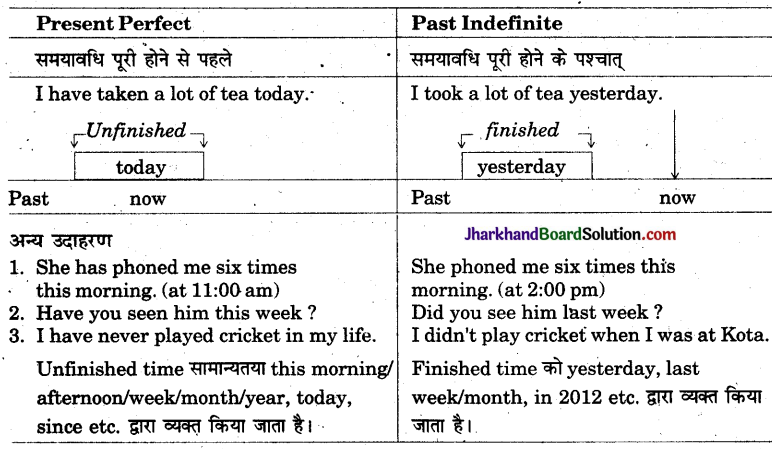
Exercise 8.
Fill in the blanks with Present Perfect or Past Indefinite:
1. I …………………. in Jaipur for five years. (live)
2. Someone ………….. my bike ! Now I’ll have to walk home. (steal)
3. When Bharat was young he …………………. in Mathura. (live)
4. I would like to visit South India sometime. Unfortunately, I …………………. there. (never be)
5. Tina …………………. to Jodhpur last year. (go)
6. I’m not hungry any more. I …………………. (already eat)
7. They don’t live here any more. They …………………. two years ago. (leave)
8. …………………. Ann …………………. reading the newspaper yet ? (not finish)
9. We …………………. football yesterday afternoon. (play)
10. The weather …………………. very good last week. ( be)
Answer:
1. have lived
2. has stolen
3. lived
4. have never been
5. went
6. have already eaten,
7. left
8. Has, not finished
9. played
10. was.
2. Past Continuous Tense
ऐसे वाक्यों में काम का जारी रहना भूतकाल में पाया जाता है। वाक्य के अन्त में ‘रहा था’, ‘रही थी’, ‘रहे थे’ या ‘हुआ था’, ‘हुई थी’, ‘हुए थे’ पाया जाता है।
(A) Affirmative Sentences
Pattern – Subject + was/were (ing) …….
1. मैं अपनी किताब पढ़ रहा था। I vas reading my book.
2. हम अपना पाठ याद कर रहे थें We were learning our lesson.
3. तुम मेरे नौकर को बुला रहे थे। You were calling my servant.
Rule 1. He, She, It, I और एकवचन noun subject के साथ was लगाकर verb में ‘ing’ लगाते हैं।
Rule 2. You, We, They और बहुवचन noun subject के साथ were का प्रयोग कर verb में ‘ing’ लगाते हैं।
(B) Negative Sentences
Pattern – Subject + was/were + not +V1 (ing) …….
1. वे घर नहीं जा रहे थे। They were not going home.
2. राम दीवार से नहीं कूद रहा था। Ram was not jumping over the wall.
3. वह एक गाय नहीं खरीद रहा था। He was not buying a cow.
Rule – Negative sentences में was या were के पश्चात् not लगा देते हैं।
(C) Interrogative Sentences
Pattern – Was/Were + Subject + V1 (ing) ……?
1. क्या हम बाजार जा रहे थे? — Were we going to the market?
2. क्या मोहन अपने नौकर को गाली दे रहां था ? — Was Mohan abusing his servant?
3. क्या वे लड़के शोर नहीं मचा रहे थे ? — Were those boys not making a noise ?
4. कितने लड़के मैदान में खेल रहे थे? — How many boys were playing in the field ?
5. किसान अपना खेत क्यों नहीं जोत रहा था ? — Why was the farmer not ploughing his field ?
6. वह कमरे में क्या कर रहा था ? — What was he doing in the room ?
7. कक्षा में कौन रो रहा था ? — Who was weeping in the class ?

Rule 1. Interrogative sentences में Was या Were कर्ता से पहले लगाते हैं और verb में ‘ing’ लगा देते हैं। वाक्य में सबसे पहले ‘क्या’ हो तो ‘क्या’ के लिये what नहीं लगाते। (देखिये वाक्य नं. 1, 2)
Rule 2. यदि वाक्य के बीच में प्रश्नसूचक शब्द ‘क्यों’, ‘क्या’, ‘कब’, ‘कहाँ’, ‘ कैसे’ आदि में से कोई दिया हो तो सबसे पहले उसकी अंग्रेजी लगाकर फिर was या were को लगाते हैं। (देखिये वाक्य नं. 5 तथा 6)
Rule 3. How much, How many आदि के साथ उनसे सम्बन्धि nouns भी लगाते हैं। (देखिये वाक्य नं. 4)
Rule 4. अगर वाक्य में प्रश्नवाचक शब्द अर्थात् ‘ कौन’ ही कर्ता का कार्य कर रहा हो, तो सबसे पहले उसकी अंग्रेजी, उसके बाद was या were लाते हैं, तत्पश्चात् verb में ‘ing’ लगाते हैं। (देखिये वाक्य नं. 7)
Rule 5. Negative Interrogative sentences में मुख्य क्रिया से पहले not लगा देते हैं। (देखिये वाक्य नं. 3) प्रयोग (Uses)
1. इसका प्रयोग ऐसे कार्य के लिए किया जाता है जो भूतकाल में जारी रहा हो। जैसेHe was lying in the sun. वह धूप में लेटा हुआ था।
2. इसका प्रयोग ऐसे कार्य के लिए भी होता है जो भूतकाल में कुछ समय तक जारी रहा हो और उसी बीच कोई दूसरा कार्य भी हुआ हो। इस दूसरे कार्य के लिए जो तुरन्त समाप्त हो जाता है, Simple Past Tense का प्रयोग करते हैं तथा जिस Clause में कार्य जारी रहा हो उसमें Past Continuous का प्रयोग करते हैं। जैसे-
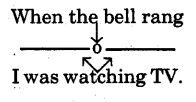
3. इसका प्रयोग ऐसे दो या दो से अधिक वाक्यों के लिए भी होता है जो भूतकाल में साथ- साथ जारी रहे हों। ये प्राय: while से जुड़े होते हैं। जैसे-I was reading a story while Hari was writing letters.
4. यदि इस tense के वाक्य के साथ time दिया हो तो वह यह दर्शाता है कि कोई कार्य उस समय पर लगातार चल रहा था। जैसे – At 3:00 p.m. they were playing tennis.
5. कहीं घटित हो रही घटना का वर्णन करने के लिए। जैसे- My father was reading newspaper.
पहचान : इस प्रकार के वाक्यों की कोई विशिष्ट पहचान नहीं होती, परन्तु इन वाक्यों में at that time, at that moment, those days, then जैसे Adverbials आते हैं। इसी प्रकार while से जुड़े दो वाक्यों में से यदि एक वाक्य Past Continuous में हो तो दूसरा भी इसी Tense में मानना चाहिए।
Exercise 9.
Fill in the blanks with Past Indefinite or Past Continuous :
1. When I ……………………… to school, I ……………………… Jaya. (walk, see)
2. When I ……………………… in the kitchen, Maya (help, come)
3. While she …………….. the food, the children …………….. (cook, play)
4. While they …………….. cards, the baby …………….. (play, sleep)
5. When I …………….. in the garden, my uncle …………….. me. (work, call)
6. Arvind …………….. TV, while Varsha and Rani …………….. football. (watch, play)
7. When she …………….. tennis, it …………….. to rain. (play, begin)
8. The boys in the garden, while she .,……………… the flowers. (help, water)
9. He …………….. Mary, when he …………….. through the park. (meet, walk)
10. We …………….. computer gaines, while she …………….. a book. (play, read)
Answer:
1. was walking, saw
2. was helping, came
3. was cooking, were playing
4. were playing, was sleeping
5. was working, called
6. was watching, were playing
7. was playing, began
8. were helping, was watering
9. met, was walking
10. were playing, was reading.
Exercise 10.
Fill in the blanks with Past Indefinite or Past Continuous:
1. They …………….. (play) cards, when the postman …………….. (come).
2. I …………….. (sweep) the floor, when I …………….. (hear) a noise.
3. She …………….. (watch) TV, when the doorbell …………….. (ring).
4. We …………………. (hear) a cry and …………………………….. (run) into the kitchen.
5. When the phone …………….. (ring), mom …………….. (work) in the garden.
6. Veena …………….. (take) a photo, when I (run) into the kitchen.
7. They ………………….. (read) a book, when the lights …………….. (work) in the garden.
8. While Gautam …………….. (repair) his bike, Ramesh …………….. (go) out.
9. We …………….. (talk) about the movie while we ……………..(play) computer games.
10. They …………….. (forget) their lunch at home last Friday.
Answer:
1. were playing, came
2. was sweeping, heard
3. was watching, rang
4. heard, ran
5. rang, was working
6. took, was dancing
7. were reading, went
8. was repairing, was playing
9. talked, were walking
10. forgot.
3. Past Perfect Tense
1. इस Tense के वाक्यों में भूतकाल में किसी कार्य का निश्चित अवधि से पहले समाप्त हो जाना पाया जाता है अथवा दो कार्य भूतकाल में समाप्त होते हैं, एक पहले तथा दूसरा बाद में।
2. इन वाक्यों के अन्त में साधरणतया ‘चुका था’, ‘चुकी थी’, ‘चुके थे’, ‘या था’, ‘ये थे’ आदि शब्द आते हैं।
(A) Affirmative (Positive) Sentences
Pattern – Subject had V3 …………
1. वर्षा होने से पहले हम घर पहुँच चुके थे।
We had reached home before it rained.
2. मेरे स्टेशन पहुँचने से पहले गाड़ी छूट चुकी थी।
The train. had started before I reached the station.
3. अपना पाठ याद करने के पश्चात् राम स्कूल चला गया।
Ram went to school after he had learnt his lesson.
Rule 1. एकवचन तथा बहुवचन कर्ता दोनों के साथ ‘had’ लगाकर verb की third form लगाते हैं।
Rule 2. जिन वाक्यों में दो कार्य भूतकाल में पाये जायें उनमें से जो काम पहले समाप्त हो चुका हो उसको Past Perfect Tense में अर्थात् कर्ता, फिर had, इसके बाद क्रिया की third form लगाते हैं और जो कार्य बाद में हुआ हो उसको Past Indefinite में बनाते हैं अर्थात् सबसे पहले कर्ता और फिर verb की second form लगाते हैं। (देखिये वाक्य नं. 1, 2)
Rule 3. वाक्यों में ‘पश्चात्’ या ‘बाद’ शब्द प्रयोग होने पर बाद में होने वाला कार्य प्रधान उपवाक्य (Principal clause) होगा तथा पहले होने वाला कार्य आश्रित उपवाक्य (Subordinate clause) होगा। ऐसी स्थिति में Principal clause में प्रत्येक कर्ता के साथ क्रिया की second form का प्रयोग होगा तथा Subordinate clause में had के साथ क्रिया की third form का प्रयोग होगा। (देखिये वाक्य नं. 3)

(B) Negative Sentences.
Pattern – Subject
1. मैंने यह घर पहले नहीं देखा था।
I had not seen this house before.
2. डॉक्टर के आने से पहले मरीज मरा नहीं था।
The patient had not died before the doctor came.
3. पुलिस के आने से पूर्व चौर भाग नहीं चुका था।
The thief had not ruin away before the police came.
Rule – Negative sentences में had के आगे not का प्रयोग करते हैं।
(C) Interrogative Sentences
Pattern – Had + Subject + V3 …….?
1. क्या मेरे स्कूल पहुँचने से पहले घण्टा बज चुका था ?
Had the bell rung before I reached school ?
2. क्या बस छूटने से पहले हम बस स्टैण्ड नहीं पहुँच गये थे ?
Had we not reached the bus-stand before the bus started?
3. सूरज छिपने से पहले कितने बच्चे सो चुके थे ?
How many children had slept before the sun set?
4. हमारे आने से पहले वह लड़की कौन-सा गाना गा चुकी थी ?
Which song had that girl sung before we came?
5. मेरे सोने से पहले तुम पत्र क्यों लिख चुके थे ?
Why had you written a letter before I slept?
6. डॉक्टर साहब के जाने के बाद रोगी ने क्या खाया था ?
What did the patient eat after the doctor had gone ?
Rule 1. प्रश्नवाचक वाक्यों में यदि ‘क्या’ सबसे पहले आये तो Had को subject से पहले ले आते हैं। ऐसे वाक्यों में what का प्रयोग नहीं करते हैं। (देखिये वाक्य नं. 1,2 )
Rule 2. अगर वाक्य के बीच में प्रश्नवाचक शब्द हो तो अनुवाद करते समय उसकी अंग्रेजी सबसे पहले आती है, फिर had आता है, फिर कर्ता और फिर verb की third form आती है। (देखिये वाक्य नं. 5)
Rule 3. कितने, कितना, कौन-सा, किसको आदि प्रश्नवाचक शब्दों के साथ उनसे सम्बन्ध रखने वाले nouns भी लगाते हैं। (देखिये वाक्य नं. 3 और 4 )
Rule 4. Negative Interrogative sentences में subject के बाद not लगाते हैं। (देखिये वाक्य नं. 2)
संकेत – ‘बाद’ वाले वाक्यों के पहले भाग में did लगाते हैं। (देखिये वाक्य नं. 6)
प्रयोग (Uses)
1. इस Tense का प्रयोग ऐसे कार्य के लिए होता है जो भूतकाल में किसी दूसरे कार्य से पहले समाप्त हो गया हो अर्थात् जो कार्य पहले हो जाता है, उसमें Past Perfect Tense का प्रयोग होता है तथा जो कार्य बाद में होता है, उसमें Simple Past Tense का प्रयोग होता है। ऐसे दो वाक्यों को जोड़ने के लिए before, when, after, till, until आदि Conjunctions का प्रयोग होता है। जैसे-
- They had practised before they did it. या Before they did it they had practised. (यहाँ पर ‘they had practised’ कार्य पहले हुआ है तथा ‘they did it’ बाद में हुआ है।)
- He had seen the ball before he hit it.
- He had worked very hard before he finally won.
- He went out after the rain had stopped.
(‘The rain had stopped’ यह कार्य पहले हुआ है। ‘He went out’ यह कार्य बाद में हुआ है।)
या
After the rain had stopped, he went out.
नोट – (a) after के पश्चात् सामान्यतया Past Perfect का प्रयोग होता है।
अर्थात्
After + Past Perfect + Past Indefinite या Past Indefinite + after + Past Perfect
(b) सामान्यतया before के पश्चात् वाला Clause Past Indefinite में होता है।
अर्थात्
Past Perfect + before + Past Indefinite या Before + Past Indefinite + Past Perfect
(i) He had liked it before this happened.
(ii) The report had been ready before you spilled the coffee.
(c) till/until के साथ
till/until + Past Indefinite + Past Perfect का प्रयोग किया जाता है।
He had been healthy until he started overeating.
Note :
(a) जब दो कार्य साथ-साथ हो रहे हों तो दोनों में Simple Past Tense का प्रयोग करते हैं। जैसे As soon as he saw the police, he ran away.
(b) भूतकाल की अकेली घटना के लिए इस Tense का प्रयोग नहीं हो सकता है। जैसे-
I had finished my work yesterday. — (Incorrect)
Ifinished my work yesterday. — (Correct)
2. Direct Speech के Simple Past Tense या Present Perfect Tense, Indirect Speech में Past Perfect Tense में बदल दिये जाते हैं। जैसे-
Direct : He said, “I left the school a few months ago.”
Indirect : He said that he had left the school a few months before.
Direct : Sita said, “I have already read this book.”
Indirect : Sita said that she had already read that book.

3. इस Tense का प्रयोग ऐसे Conditional Clause में होता है जिसमें शर्त भूतकाल में पूरी न हुई हो। Conditional Sentences Type – III के साथ।
Pattern : If + Past perfect + ……………………. would have/should have +V3
If you had reached the station in time, you would have met your friend. :
यदि तुम समय से स्टेशन पहुँच गये होते तो तुम्हें तुम्हारा मित्र मिल गया होता। (लेकिन नहीं मिला।).
4. भूतकाल (Past Time) की किसी अपूर्ण इच्छा को व्यक्त करने के लिए इस. Tense का प्रयोग wish, would sooner/rather, if only, as if, as though के साथ होता है। जैसे-.
(i) I wish I hadn’t telephoned her ( = I am sorry I telephoned her).
(ii) If only I had seen the thief ( = but couldn’t see).
Exercise 11.
Fill in the blanks with Past Indefinite and Past Perfect Tense :
1. After Columbus ……………….. (discover) America, he ……………….. (return) to Spain.
2. Before they ……………….. (move) to Udaipur, they ……………….. (sell) everything.
3. After he ……………….. (work) very hard, he ……………….. (fall) ill.
4. She ……………….. (open) the box after she ……………….. (find) the key.
5. Before he ……………….. (move) away from the lawn, he ……………….. (pick) some roses.
6. They……………….. (drink) a cup of tea after they (finish) lunch.
7. He ……………….. (ask) me for her telephone number before he ……………….. (phone) her.
Answer:
1. had discovered, returned
2. moved, had sold
3. had worked, fell
4. opened, had found
5. moved, had picked
6. drank, had finished
7. had asked, phoned.
| Present Perfect व Past Perfect में अंतर |
| Present Perfect का प्रयोग ऐसे कार्यों को व्यक्त करने के लिए किया जाता है जो भूतकाल में शुरू होकर वर्तमान तक चला हो। जैसे- (i) Who is that boy?
I have never seen him. (ii) The room is dirty.
Nobody has cleaned it for a long time. | Past Perfect का प्रयोग ऐसे कार्य को व्यक्त करने के लिए किया जाता है जो भूतकाल में ही शुरू होकर भूतकाल में ही समाप्त हो गया हो । जैसे- (i) I didn’t know who he was. I had never seen him. (= उस समय से पहले) (ii) The room was dirty. Nobody had cleaned, it for a long time. |
Exercise 12.
Fill in the blanks with the Present Perfect or Past Perfect:
1. They ……………….. (go) on a trip to Jaipur before moving to Kota.
2. She ……………… (cut) her hair but she didn’t like it.
3. He ……………… (work) here since last spring when he had an accident.
4. Someone ……………… (steal) my car.
5. They …………………….. (not come) to his party because they were sick.
6. When I went to park the car, I found that someone ……………… (steal) my car.
7. They told that I ……………… (lose) my chance.
Answer:
1. had gone
2. had cut
3. had worked
4 has stolen
5. had not come
6. had stolen
7. had lost
4. The Past Perfect Continuous Tense
इस Tense के वाक्यों से प्रकट होता है कि कार्य भूतकाल में किसी समय प्रारम्भ होकर उसके बाद तक चलता रहा। भूतकाल में कार्य जारी रहने का समय दिया होता है। अंग्रेजी में अनुवाद करने के नियम
1. सभी प्रकार के Subjects के साथ had been लगाकर क्रिया के First Form के अन्त में ing लगाते हैं।
Pattern : Subject had been + V1 (ing) + object + for/since + time. जैसे-
(i) He had been studying for two hours last night.
(ii) I had been walking in the park since yesterday morning.
2. Negative Sentences में had के ठीक बाद not लगाते हैं।
जैसे- It had not been raining yesterday since morning.
3. प्रश्नवाचक वाक्यों में had को कर्ता से पहले रखते हैं।
जैसे- Had your brotherbeen buying toys for two hours yesterday?
प्रयोग (Uses)
इसका प्रयोग ऐसे कार्य के लिए होता है जो भूतकाल में किसी समय से प्रारम्भ होकर भूतकाल में ही किसी समय तक जारी रहा हो। इस tense के वाक्य में since/for/all के साथ समय के साथ ही साथ एक और भूतकाल का समय या clause अवश्य ही दिया हुआ होता है। जैसे –
(i) When he came, I had been watching TV for two hours.
(ii) When he came, I was very tired. I had been working all day.
Exercise 13
Fill in the blanks with the Past Perfect or the Past Perfect Continuous form of the verbs given in the brackets.
1. Radha …………. (prepare) a beautiful meal for her guests and everybody enjoyed it.
2. When I reached there, he…………….(sing) for two hours.
3. The children ………………… (do) their homework and by 11 o’clock they still hadn’t finished.
4. When I entered the office, I found that a clerk was sleeping. He ………….. (sleep) in the office all afternoon.
5. When it started raining, we ………….. (play) cricket for an hour.
6. It was 6 p.m. and I was tired because I ………….. (work) hard all day.
Answer:
1. had prepared
2. had been singing
3. had been doing
4. had been sleeping
5. had been playing
6. had been working
The Present Perfect Continuous and the Past Perfect Continuous में अन्तर
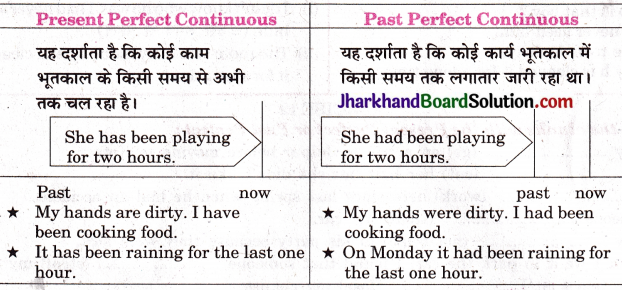

Exercise 14.
Fill in the blanks with the Present Perfect Continuous or the Past Perfect Continuous Tense.
1. I was tired. I ………….. (work) all day.
2. We ………….. (wait) for your phone call all evening.
3. I ………….. (stand) here since 9 o’clock.
4. She ………….. (learn) English for two months before she visited London.
5. It started raining yesterday and it ………….. (rain) ever since.
6. They ………….. (send) me message about it everyday for the last week
Answer:
1. had been working
2. have been waiting
3. have been standing
4. had been learning
5. has been raining
6. have been sending.
Exercise 15.
Fill in the blanks with the correct form of the verbs given in the brackets:
1. Hari the game when I went to his house ……………… (play)
2. When we reached his home, he plants. …………….. (water)
3. Sita her work before I went to her …………….. (complete)
4. As soon as he saw the teacher, he away. …………….. (run)
5. When I went to Sita, she a letter. …………….. (write)
6. When we reached the hospital, the patient …………….. (die)
7. If he me, I would have helped him. ……………… (ask)
Answer:
1. was playing
2. was watering
3. had completed
4. ran
5. was writing
6. had died
7. had asked.
Future Action
आर्धुक अंग्रेजी में केवल दो ही tenses होते हैं- Present तथा Past. Future समय होता है जिसे निम्नलिखित प्रकार से व्यक्त किया जा सकता है-
1. The Simple Present W Present Indefinite
2. Will + infinitive – इरादा व्यक्त करने के लिए।
3. The Present Continuous Tense
4. The “be + going to” form
5. The Future Simple
6. The Future Continuous
7. The Future Perfect
8. The Future Perfect Continuous
1. The Simple Present for Future Action
इस tense का प्रयोग निम्नलिखित स्थितियों में Future Action को व्यक्त करने के लिए किया जा सकता है-
(A) जब कोई Future Action निश्चित Time-Table के अनुसार हो-
(i) Our school opens at 10:30 a.m.
(ii) I go to cinema tonight.
(मैं आज सिनेमा जा रहा हूँ परन्तु यह plan सम्भवतया मेरे द्वारा नहीं बनाया गया है। यह plan का एक हिस्सा है।) अर्थात् इसके द्वारा व्यक्त किया गया कार्य impersonal हृोता है। इसमें कर्ता का कोई involvement नहीं होता है। जबकि Present Continuous व्यक्तिगत होता है। जैसे-
I am going to cinema tonight. (यह मेरा अपना व्यक्तिगत plan है।)
(B) इसका प्रयोग औपचारिक घोषणाओं के साथ किया जाता है जो कि future plan से संबंधित होंजैसे – Wall Mart opens a new store at Kota next week.
जबकि Present Continuous अनौपचारिक होता है। जैसे-
I am opening a new store at Kota next week.
(C) Series of Future Actions (जब भविष्य की योजना एक शृंखला के रूप में हो) विशेष तौर पर यात्रा संबंधी Future plan के लिए भी इसी का प्रयोग किया जाता है। जैसे-
We leave at 7:00, arrive Jaipur at 11:00 and take the train for Kota at 11:30 …… .
(D) Time Clause के साथ-
(i) She will phone when she reaches home. (जब वह घर पहुँच जाएगी तो वह फोन करेगी।)
(ii) Wait here, until I return. (जब तक मैं नहीं लौट्टूँ यहीं इंतजार करो।)
2. Will + infinitive (will + I form of Verb)
इस form का प्रयोग ऐसे Future Action को व्यक्त करने के लिए किया जाता है जिसको करने का निश्चय बोलते समय ही किया गया हो। ये कार्य पूर्वनियोजित नहीं होते हैं। जैसे-
(i) Mother : The milk is boiling.
Son : I will put out the stove.
(ii) Waiter: What would you like to have?
Customer : I will have a potato paratha.
परन्तु यदि किसी कार्य को करने का निर्णय कर लेने के पश्चात् वक्ता उस कार्य का वर्णन दोबारा करे तो be going to या Present Continuous का ही प्रयोग किया जायेगा will + infinitive का नहीं। जैसे-
उपरोक्त उदाहरण
(i) में mother कंहेगी Tom is putting out/going to put out the stove.
उदाहरण
(ii) में Customer से यदि दोबारा कोई पूछता है तो वह कहेगा-
I am having/am going to have a potato paratha.
3. The Present Continuous for Future Action
(a) इसका प्रयोग निकट भविष्य में definite arrangement को व्यक्त करने के लिए किया जाता है। जैसे-I am buying a new car next week.
इस वाक्य से तात्पर्य है कि मैंने कार खरीदने की पक्की योजना बना ली। मैंने model भी बुक करा दिया है। I am seeing my dentist tonight, से तात्पर्य है कि मैंने dentist से मिलने का समय व इजाजत ले ली है।

(b) निम्नलिखित प्रकार की क्रियाओं के साथ Present Continuous का प्रयोग किया जाता है। ये बगैर किसी definite arrangement के एक decision या plan को व्यक्त करती हैं।
ये क्रियाएँ हैं-
- एक स्थान से दूसरे स्थान को गति (movement) बताने वाली verbs – go, come, arrive, reach, drive, sail, fly, start, travel इत्यादि
- Position बतानी वाली क्रियाएँ- stay, remain इत्यादि ।
- खाना तथा पीना बताने के लिए do तथा have जैसे-
(i) I am going home.
(ii) We are flying to New York.
(iii) She is staying at home.
(iv) He is not doing anything.
(c) जिन Verbs का प्रयोग Continuous Tense में नहीं किया जा सकता है उनका प्रयोग Future Simple में ही करते हैं। जैसे-
(i) You will understand it tomorrow.
(ii) The principal will think over it.
4. The ‘be going to’ form used for intention
Form – ‘be goint to’ + की I form
इस form का प्रयोग कर्त्ता के किसी Future Action को करने के इरादे (Intention) को व्यक्त करने के लिए किया जाता है। यह इरादा हमेशा ही पूर्व नियोजित होता है और यह भी पता चलता है कि इसके लिए कुछ तैयारी भी कर ली गई है। अर्थात् be going to द्वारा व्यक्त किये गये
Future Action के घटित होने की पूरी सम्भावना होती है।
(A) समय के साथ निकट भविष्य में होने वाले कार्य को व्यक्त करने के लिए Present Continuous के स्थान पर इसका प्रयोग किया जा सकता है। जैसे-
- I am receiving my mother at the station at 9:00.
- I am going to receive my mother at the station at 9:00.
परन्तु दोनों ही वाक्यों के कार्य में arrangement का अन्तर है।
वाक्य (i) बताता है कि यहाँ पर arrangement है। मैं अपनी माताजी को receive कर रहा हूँ जिसके बारे में उन्हें पता है।
वाक्य (ii) में arrangement नहीं है। हो सकता है कि मेरी माताजी मुझे देखकर चौंके।
(B) The ‘be going to’ form का प्रयोग हमेशा ही पूर्वनियोजित इरादों तथा intention + plan को व्यक्त करने के लिए किया जाता है जबकि will + infinitive form का प्रयोग ऐसे इरादों को व्यक्त करने के लिए किया जाता है जो कि पूर्व-नियोजित नहीं होते हैं। इसलिए यदि किसी कार्य को करने की तैयारी कर ली गई है तो be going to का ही प्रयोग किया जायेगा। जैसे-
(i) A : Why are you buying a soap ?
B : I am going to wash my clothes.
(ii) A : I am cooking rice but I don’t know how to cook them ?
B : Don’t worry, I will be teaching you everything.
(C) सामान्यतया will + infinitive का प्रयोग I person के साथ intention व्यक्त करने के लिए किया जाता है। II तथा III person के साथ intention को व्यक्त करने के लिए सामान्यतया ‘be going to’ का प्रयोग किया जाता है। जैसे –
- They are going to join American Institute.
- He is going to join American Institute.
लेकिन won’t का प्रयोग सभी persons के साथ negative intention व्यक्त करने के लिए किया जाता है जिसका तात्पर्य refusal होता है। He won’t come. (वह आने से इंकार करता है।)
Exercise 16.
Fill in the blanks with Present Continuous or ‘be going to’ form of the verbs given in the brackets:
1. I ……………. (play) tennis with Radha and Ravi.
2. I ……………. (have) some friends for dinner tomorrow.
3. I ……….. (get) my hair cut tomorrow.
4. Our school ………… (start) French next term.
5. I ………… (spend) a few days in Jaipur next month.
6. Panchayat ………… (build) a new school building here.
7. He ……………. (leave) tomorrow.
8. I ……………. (giving) her a gift on her birthday.
9. She ……………. (see) a dentist next week.
10. He ……………. (wash) his car.
Answer:
1. am playing
2. am having
3. am getting
4. is starting
5. am spending
6. is going to build
7. is leaving
8. am giving
9. is seeing
10. is going to wash.
Exercise 17.
Fill in the blanks with Present Indefinite or Present Continuous for Future Action :
1. I ………… (take) my wife out for dinner tonight.
2. The 10:30 train ……………….. (return) by 14:20.
3. The girls and I ……………….. (go) out tonight.
4. At 7:00 a.m., we ……………….. (leave) for Kota.
5. The return train ……………….. (depart) one hour late.
6. We ……………….. (see) each other sometime in the future.
7. ……………….. you ……………….. (go) to the cinema tonight?
Answer:
1. am taking
2. returns
3. are going
4. leave
5. departs
6. are seeing
7. Are, going.
1. The Future Simple
वैसे तो आधुनिक व्याकरण में कोई Future Tense नहीं होता है लेकिन सुविधा के लिए will/shall + bare infinitive (verb की I form) को Future Simple के रूप में व्यक्त किया जाता है।
- इस प्रकार के वाक्यों में काम का होना या करना भविष्यत्काल में पाया जाता है।
- वाक्य के अन्त में गा, गी, गे पाये जाते हैं।
(A) Affirmative (Positive) Sentences
Pattern – Subject + will/shall +V1 ……………
1. मैं एक पत्र लिखूँगा। — I shall write a letter.
2. हम कल स्कूल जायेंगे। — We shall go to school tomorrow.
3. तुम एक किताब पढ़ोगे। — You will read a book.
Rule – अंग्रेजी में अनुवाद करते समय I और We के साथ shall और अन्य subjects के साथ will लगाकर verb की first form लगाते हैं।

(B) Negative Sentences
Pattern – Subject + will/shall + not +V1 ……………
1. मैं कल अलीगढ़ नर्ही जाऊँगा। — I shall not go to Aligarh tomorrow.
2. लड़के दिन में नहीं सोयेंगे। — The boys will not sleep in the day.
Rule – Negative sentences में will या shall के पश्चात् not लगा देते हैं।
(C) Interrogative Sentences
Pattern – Will/Shall + Subject +V1 ……………
1. क्या वह तुमको कुछ कलमें देगा ? — Shall we eat mangoes?
2. क्या हम आम खायेंगे ? — Will he give you some pens?
3. क्या तुम्हारे भाई कल नहीं आयेंगे ? — Will your brothers not come tomorrow ?
4. सीता कौन-सा गाना गायेगी ? –Which song will Sita sing?
5. वह कितनी पुस्तकें खरीदेगा ? — many books will he buy?
6. हम कल कहाँ जायेंगे ? — Where shall we go tomorrow ?
7. तुम्हारे पुत्र को कौन पीटेगा ? — Who will beat your son ?
Rule 1. जिन वाक्यों में ‘क्या’ सबसे पहले आये, अंग्रेजी में अनुवाद करते समय Shall या Will वाक्य में subject से पहले ले आते हैं। (देखिये वाक्य नं. 1 और 2 )
Rule 2. यदि वाक्य के बीच में प्रश्नवाचक शब्द हो तो उसकी अंग्रेजी सबसे पहले लगाते हैं, उसके पश्चात् shall या will, फिर verb की first form लगाते हैं। (देखिये वाक्य नं. 6)
Rule 3. How much, How many, Whose, Which के साथ उनसे सम्बन्धित noun भी लगाते हैं। (देखिये वाक्य नं. 4 व 5 )
Rule 4. अगर कोई प्रश्नवाचक शब्द subject का कार्य कर रहा है तो उसकी अंग्रेजी सबसे पहले लगाते हैं, फिर will या shall फिर verb की first form लगाते हैं। (देखिये वाक्य नं. 7)
Rule 5. Negative Interrogative sentences का अनुवाद Interrogative Affirmative sentences की तरह ही होगा केवल Subject के बाद not लग जाता है। (देखिये वाक्य नं. 3 )
प्रयोग (Uses) – इसका प्रयोग निम्नलिखित कार्यों के लिए होता है-
(a) वक्ता की भविष्य के बारे में राय, विचार, तुलना इत्यादि व्यक्त करने के लिए इसका प्रयोग किया जाता है। जैसे-
(i) She will get first division. ( मुझे पक्का विश्वास है।)
(ii) We will find the teacher at home. (सम्भवतया)
(iii) My brother will sell his car. ( मेरा मानना है।)
इस tense का प्रयोग time-expression के साथ तथा इसके बगैर भी किया जा सकता है।
(b) इसका प्रयोग Future के उन habitual actions के साथ किया जा सकता है जो हमारे विचार से भविष्य में हो सकते हैं। जैसे-
(i) Summer will come again.
(ii) People will plough their fields.
(C) Conditional Sentences type-I के साथ-
If + Present + Future
If you come to me, I’ll help you.
(d) Time Clause के साथ Future बताने के लिए-
Future + Time Clause in Present
We’ll go home when he comes.
Exercise 18.
Fill in the blanks with Present Continuous or Future Simple:
1. I ………………. (not reply) you unless you write to me.
2. I ……………….(wait) here until she comes back.
3. If you don’t work hard, you …………….. (not pass) this year.
4. Our class ………………. (play) a friendly football match next Sunday.
5. My mother …………… (come) on Monday.
6. She …………… (go) again next Monday.
7. He…………… (know) about it tonight.
Answer:
1. will not reply
2. shall wait
3. will not pass
4. is playing
5. is coming
6. is going
7. will know.
2. The Future Continuous
इन वाक्यों के अन्त में ‘रहा होगा’, ‘रही होगी’, ‘रहा हूँगा’, ‘रहे होंगे’ आदि पाया जाता है।
(A) Affirmative (Positive) Sentences
Pattern – Subject + will/shall + be + V1 (ing) ……
1. मैं अपना पाठ याद कर रहा हूँगा। I shall be learning my lesson.
2. वह एक पत्र किख रही होगी। She will be writing a letter.
Rule 1. I और we के साथ shall be लगाते हैं और verb की I form में ‘ing’ लगाते हैं।
Rule 2. शेष सब कर्ताओं के साथ will be लाकर verb की I form में ‘ing’ लगाते हैं।
(B) Negative Sentences
Pattern – Subject + will/shall + not + be + V1 (ing) ……?
1. मैं कक्षा में नहीं पढ़ रहा हूँगा। — I shall not be reading in the class.
2. वे लड़कों को नहीं पढ़ा रहे होंगे। — They will not be teaching the boys.
Rule – Negative sentences में will या shall के बाद not लगाते
(C) Interrogative Sentences
Pattern – Will/Shall + Subject + be +V1 (ing) …… ?
1. क्या वह अपना पाठ याद कर रहा होगा ? — Will he be learning his lesson?
2. क्या मैं अपने गाँव पैदल जा रहा हूँगा ? — Shall I be going to my village on foot?
3. तुम्हारे पिताजी कल कहाँ जा रहे होंगे ? — Where will your father be going tomorrow ?
4. वह अपनी पुस्तक क्यों नहीं पढ़ रहा होगा ? — Why will he not be reading his book ?
5. कमरे में कितने लड़के सो रहे होंगे ? — How many boys will be sleeping in the room ?
6. मैदान में कौन खेल रहा होगा ? — Who will be playing in the field?
Rule 1. जिन वाक्यों में सबसे पहले ‘क्या’ लगा हो उनका अनुवाद करते समय Will या Shall वाक्य में सबसे पहले लगाते हैं। उसके बाद कर्ता, फिर be और इसके पश्चात् verb की I form में ‘ing’ लगाते हैं। (देखिये वाक्य नं. 1 तथा 2)
Rule 2. अगर वाक्य के बीच में प्रश्नवाचक शब्द हो तो उसकी अंग्रेजी सर्वप्रथम लाकर will या shall लगाते हैं। (देखिये वाक्य नं. 3)
Rule 3. How much, How many, Which के साथ उनसे सम्बन्धित nouns भी लगाते हैं। (वाक्य नं. 5)
Rule 4. यदि प्रश्नवाचक शब्द Who कर्ता का कार्य कर रहा हो तो सबसे पहले उसे लाकर will be या shall be लगाते हैं। (देखिये वाक्य नं. 6)
Rule 5. Negative Interrogative sentences में be से पहले not और लगा देते हैं। (देखिये वाक्य नं. 4)
प्रयोग (Uses) — इसका प्रयोग निम्नलिखित स्थिति में किया जाता है-
(a) एक सामान्य Continuous Tense की तरह-
अन्य Continuous Tenses की ही तरह से सामान्यतया इसका प्रयोग समय बिन्दु के साथ किया जा सकता है। कोई action जो कि भविष्य में उस समय के पूर्व शुरू होकर उसके कुछ समय पश्चात् भी चलता रहेगा।

(b) To express future without intention –
जब कोई कार्य Future में बगैर किसी intention के घटित होता है तो भी इसका प्रयोग किया जाता है। इसमें कर्ता का कोई involvement नहीं होता है। ये कार्य स्वतः ही होते हुए पाये जाते हैं। जैसे-
(i) I will be seeing Ms Rita tomorrow. We work in the same office.
(ii) We will be travelling next Sunday at this time.
Future Continuous तथा Present Continuous में अंतर
Present Continuous में arrangement होता है जबकि Future Continuous में intention तथा arrangement नहीं होता है। जैसे-
I am seeing Ms Rita tomorrow. से तात्पर्य है कि मैंने रीता से कल मिलने का समय लिया है। जबकि
I will be seeing Ms Rita tomorrow. से तात्पर्य है कि हो सकता है कि दोनों एक ही office में कार्य करते हैं और यह उनके routine का कार्य है। यहाँ पर न तो intention है और न ही arrangement है।
Exercise 19
Fill in the blanks with will + infinitive or Future Continuous of the verbs given in the brackets.
1. Kamal : We have missed the train.
Naman : Never mind, we ………….. (walk)
2. Teacher : Your hands are dirty.
Student : All right, I ………….. (wash) them.
3. Mother : You have left the tap running.
Son : So, I have. I ………….. (turn) it off.
4. Everything is ready. Our chief guest …………. (arrive) any minute.
5. She …………….. (come) if you ask her.
Answer:
1. will walk
2. will wash
3. will turn
4. will be arriving
5. will come.

3. The Future Perfect
ऐसे वाक्यों के अन्त में ‘चुकेगा’, ‘चुकूँगा’, ‘चुकोगे’ ‘चुका होगा’, ‘कर लिया होगा’ आदि शब्द आते हैं।
(A) Affirmative (Positive) Sentences +V3 ……………. ?
Pattern – Subject + will/shall + have
1. तुम्हारे आने से पहले वह अपना पाठ यांद कर चुकेगा।
He will have learnt his lesson before you come.
2. सात बजने से पहले हम अपना खाना खा चुके होंगे।
We shall have taken our food before it is seven.
Rule 1. यदि एक ही वाक्य में भविष्य में दो कामों का होना पाया जाये तो पहले होने वाले काम के लिये will have या shall have तथा मुख्य verb की third form का प्रयोग करते हैं। दूसरे काम के लिये subject के अनुसार Present Indefinite tense की verb का प्रयोग करते हैं।
Rules 2. I और We के साथ shall have लगाते हैं और बाकी सबके साथ will have लगाते हैं।
(B) Negative Sentences
Pattern – Subject + will/shall + not + have +V3 …………….
1. हरी के आने से पहले वह पत्र नहीं लिख चुकी होगी।
She will not have written the letter before Hari comes.
2. अध्यापक के आने से पहले मैंने अपना काम समाप्त नहीं किया होगा।
I shall not have finished my work before the teacher comes.
Rule – Negative वाक्यों में will या shall के बाद not लगाते हैं।
(C) Interrogative Sentences
Pattern – Willshall + Subject + have + V3 ……………. ?
1. क्या सात बजने से पहले लड़के मैच खेल चुकेंगे ?
Will the boys have played the match before it is seven ?
2. क्या गाड़ी आने से पहले हम टिकट नहीं ले चुके होंगे ?
Shall we not have taken the tickets before the train arrives?
3. सूरज छिपने से पहले कितने लड़के यहाँ आ चुके होंगे ?
How many boys will have come here before the sun sets ?
4. वर्षा होने से पहले वह कहाँ जा चुका होगा ?
Where will he have gone before it rains?
Rule 1. Interrogative sentences में will या shall सबसे आरम्भ में लगाते हैं। (देखिये वाक्य नं. 1 तथा 2)
Rule 2. अगर वाक्य के बीच में प्रश्नवाचक शब्द दिया हो तो सबसे पहले उसकी अंग्रेजी, फिर will या shall, फिर कर्ता और फिर have के साथ verb की third form लगाते हैं। (देखिये वाक्य नं. 4)
Rule 3. How much, How many, Whose और Which के साथ उनसे सम्बन्ध रखने वाले nouns भी लगाते हैं। (देखिये वाक्य न 3 )
Rule 4. अगर वाक्य Negative Interrogative हो तो subject के पश्चात् not लगा देते हैं। (वाक्य नं. 2)
(Uses)
1. इस Tense का प्रयोग ऐसे कार्य के लिए होता है जो भविष्य में किसी निर्धरित समय तक समाप्त हो चुकेगा। जैसेHe will have retùrned home by next month.
2. इस Tense का प्रयोग समयसूचक Clauses के साथ भी होता है। जो Clause समय बताता है, उसमें Simple Present Tense का प्रयोग होता है। जैसे-
When you come back, I shall have bought the book.
जब तुम वापिस आओगे तो मैं पुस्तक खरीद चुका होऊँगा।
पहचान : प्रायः इन वाक्यों के प्रारम्भ या अन्त में by + time या by the end of (time) दिया हुआ होता है। जैसे-
- They will have finished their work by evening.
- We shall have built this building by the end of March.
4. The Future Perfect Continuous
इस Tense के वाक्यों में कार्य का भविष्य काल में जारी रहना पाया जाता है तथा साथ ही साथ समय दिया होता है। वाक्य के अन्त में ‘रहेंगे, रहेगी, रहूँगा, रहोगे, रहेंगी या रहा होगा, रही होगी, रहे होंगे, रही होंगी, रहा हूँगा’ आते हैं। कार्य शुरू होने का समय दिया होता है।
(A) Affirmative (Positive) Sentences
Pattern – Subject + will/shall + have been + V1 (ing) + since / for + time.
1. वे दो घण्टे तक खेलते रहेंगे।
They will have been playing for two hours.
2. हम तीन साल से इस कॉलेज में पढ़ रहे होंगे।
We shall have been studying in this college for three years.
Rule 1 . I और We के साथ shall have been और अन्य subjects के साथ will have been लगाकर verb की first form में ‘ing’ लगाते हैं।
Rule 2. समय दिखाने के लिये since या for का प्रयोग करते हैं।
(B) Negative Sentences
Pattern – Subject + will/shall + not + have been + V1 (ing) + since / for + time.
वह दो वर्ष से कठिन परिश्रम नहीं कर रही होगी।
She will not have been working hard for two years.
Rule – Negative sentences में will या shall के पश्चात् not लगाते हैं।
(C) Interrogative Sentences
Pattern – Will/Shall + subject + have been + V1 (ing) since/for + time.?
1. क्या हम उसका इन्तजार सुबह से करते रहेंगे ?
Shall we have been waiting for him since morning ?
2. क्या वह आलसी लड़का दो घण्टे से सो रहा होगा ?
Will that lazy boy have been sleeping for two hours ?
3. क्या तुम दो दिन से नहीं पढ़ रहे होंगे ?
Will you not have been studying for two days?
4. वे पाँच बजे से अपना समय क्यों नष्ट करते रहेंगे ?
Why will they have been wasting their time since 5 o’clock ?
5. कितने लड़के दोपहर से शोर मचाते रहे होंगे ?
How many boys will have been making a noise since noon?

Rule 1. वाक्यों के प्रारम्भ में ‘क्या ‘ लगा रहने पर will या shall कर्ता से पहले ले आते हैं। (देखिये वाक्य नं. 1 . तथा 2).
Rule 2. अगर वाक्य के बीच में ‘प्रश्नवाचक शब्द’ हो तो उसकी अंग्रेजी सबसे पहले लगाकर will या shall का प्रयोग करते हैं। (देखिये वाक्य नं. 4 तथा 6 )
Rule 3. How many, How much, Whose, Which के साथ इनसे सम्बन्धित nouns भी लगाते हैं। (देखिये वाक्य नं. 5)
Rule 4. Negative Interrogative Sentences में subject के बाद में not लगाते हैं। (देखिये वाक्य नं. 3)
(Uses)
इस Tense का प्रयोग भविष्य में किसी समय विशेष तक जारी रहने वाले कार्य के लिए होता है।
यदि since/for/all के साथ समय के साथ ही साथ या तो by + time दिया हो या time clause in present हो तो इसका ही प्रयोग होगा।
अर्थात् – By + time + Future Perfect Continuous + since/for +time
या Time clause in Present + Future Perfect Continuaus + since/for + time
जैसे – (1) When he arrives here, they will have been playing since 3 o’clock.
(2) By the end of this month we shall have been working here for two months.
Exercise 20.
Write the correct forms of the verbs given in the brackets in the provided spaces :
1. I …………….. to Mathura tomorrow. (go)
2. He …………….. me next Sunday. (call)
3. She …………….. food at this time tomorrow. (cook)
4. We …………….. in our new house at this time next Sunday. (sit)
5. I …………….. my courses by tomorrow. her courses by next month. (finish)
7. I …………….. a bath before the day dawns. (revise)
8. He …………….. ready before the train arrives. (get)
9. My mother …………….. breakfast for us before the guests arrive. (prepare)
10. By the end of this week, he …………….. a book for fifteen days. (write)
Answer:
1. shall go
2. will call
3. will be cooking
4. shall be sitting
5. shall have finished
6. will have revised
7. shall take
8. will get
9. will haye prepared
10. will have been writing.
Tense Chart – 1
(Verb ‘To write’ सभी Tenses तथा सभी Forms में)
Note – He, She, It और Singular Subjects के साथ यह तालिका काम देगी ।
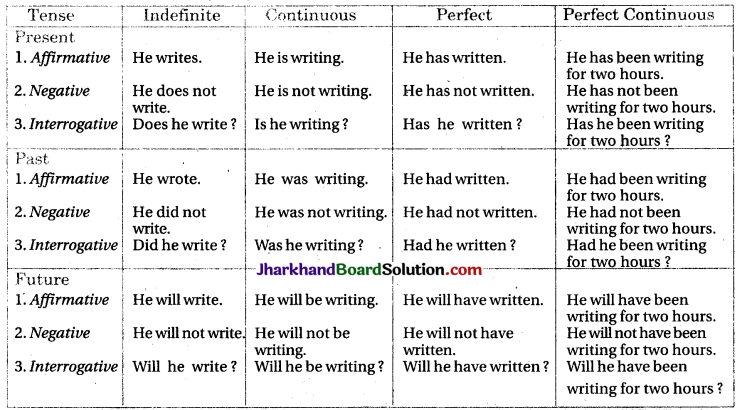
Tense Chart II.
(Verb ‘To eat’ सभी Tenses तथा सभी Forms में )
Note – I, We You, They और Plural Subjects के साथ यह तालिका काम देगी । I के साथ Indefinite Tenses में Verb के अन्त में s/es नहीं लगता है । I के साथ continuous में am/was लगता है। Future Tense में I और We के साथ प्रायः shall आता है जबकि they के साथ will का प्रयोग करते हैं।
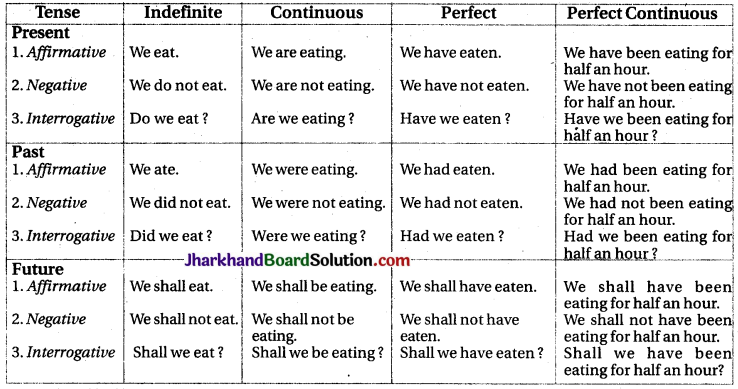
क्रिया के सही-सही रूप का प्रयोग करने के लिए तथा शुद्ध वाक्य-रचना के लिए Tenses के अतिरिक्त निम्नलिखित बातों को ध्यान में रखना आवश्यक है :
1. had better, would rather तथा let के साथ क्रिया के First Form का प्रयोग करते हैं। जैसे
(i) You had better wash your face.
(ii) Let me go.
2. क्रिया का वह रूप जो कर्ता एवं काल की सीमा में न रहे अर्थात् कर्ता एवं काल के परिवर्तन से न बदले, Infinitive कहलाता है। ऐसे Verb के First Form के पूर्व to का प्रयोग करते हैं। जैसे –
(i) He goes there to read newspapers.
(ii) He will go there to read newspapers.
Note : इन वाक्यों में to read अपरिवर्तनशील है। किन्तु कुछ क्रियाओं के बाद Infinitive का प्रयोग बिना to के भी होता है। उन क्रियाओं में से कुछ क्रियाएँ, dare, need, hear, feel, know, make, help, let, bid, see इत्यादि हैं । जैसे –
(i) Please help me lift this box.
(iii) She heard me sing.
(ii) You need not worry.
(iv) Let me read.
3. जब Simple Present का Future के अर्थ में प्रयोग हो तो in case, unless, if, when, as soon as के साथ Verb का First Form आता है। अगर Subject एकवचन हो तो क्रिया के साथ $\mathrm{s}$ या es जोड़ दिया जाता है। जैसे-
(i) In case I forget, please remind me to clear your bill.
(ii) He will teach you provided you pay him the money he asks for.
4. have, get, make, cause चार Causatives हैं। जब कर्ता स्वयं कार्य न करके दूसरे से कराता है तो इन Causatives का प्रयोग होता है। इनमें क्रिया की स्थिति इस प्रकार होती है-
(a) Sub + get/cause + doer + Infinitive + Object. (Active Form)
(i) He got a workman to whitewash his house.
(ii) He caused a washerman to wash his clothes.
(b) Sub. + have/make + doer + Verb का First Form + Object. (Active Form)
(i) I have my sister stitch my shirt.
(ii) He made us laugh in the class.
(c) Sub. + get/have + Object + Third Form of the Verb + by (doer). (Passive Form)
(i) She had her chair repaired by a carpenter.
(ii) I got my shoes polished by a cobbler.
5. without, on, for, of, need, help, mind, by, in, after, before, instead of के साथ Verb की First Form में -ing लगाते हैं। जैसे-
(i) He ran without stopping.
(ii) He kept on singing.
(iii) Her hair needs cutting.
(iv) I do not mind your smoking.

6. Lest के वाक्यांश में सभी कर्ताओं के बाद should + Verb का First Form आता है। जैसेWork hard lest you should fail.
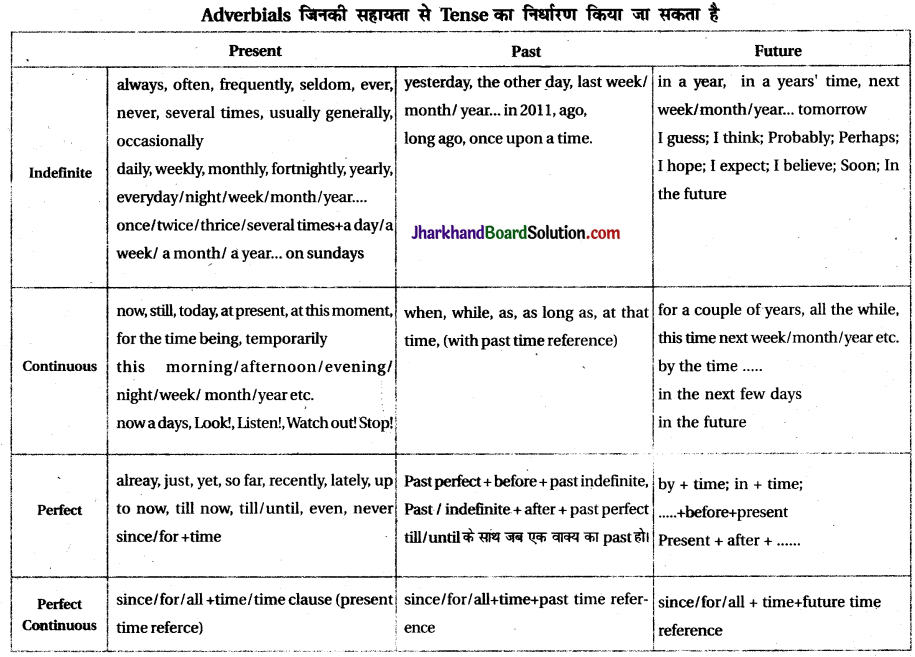
Exercise 21.
Fill in the blanks with the correct form of the verbs given in the brackets
I. I have my clothes …………. by my mother. (wash)
2. He ate all the fruits without (stop)
3. She kept on …………. clothes in her room. (Stitch)
4. We heard her …………. a song. (sing)
5. I requested him to let me …………. my home. (go)
6. He could not help …………. that side. (look)
7. The train…………. before I came. (stop)
8. He …………. out just now. (go)
9. He …………. an hour ago. (come)
10. He …………. asleep while reading. (fall)
11. I shall see him when he …………. (return)
12. The Ganga …………. in the Himalayas. (rise)
13. He …………. tea in childhood. (sell)
14. They…………. in the river last night. (swim)
15. It …………. take your umbrella. (rain)
Answer:
1. washed
2. stopping
3. stitching
4. sing
5. go
6. looking
7. had stopped
8. has gone
9. came,
10. fell
11. returns
12. rises
13. sold/used to sell
14. swam
15. is raining.

Exercise 22.
Fill in the blanks with the correct form of the verbs given in the brackets
1. Margie always hated school, but now she ……………….. [hate] it more than ever.
2. They ……………….. [make] her learn when she was six years old.
3. The inspeator ……………….. [smile] when he was finished.
4. She ……………….. (hope] they would take the teacher away altogether.
5. Sure they ……………….. [have] a teacher, but it wasn’t a regular teacher.
6. I didn’t say I ……………….. [not like] it.
7. She ………………… [think] about the fun they had.
8. They called her name and she ……………….. [not move]
9. By the time she was eleven her marks ……………….. [deteriorate]
10. By the time she was sixteen, she ……………….. [decide] to make music her life.
11. At the end of her three years course, she ……………….. [capture] most of the top awards.
12. If you work hard and know where you are going, you ……………….. [get] there.
13. My speech is clear because I could hear till I ……………….. [be] eleven.
14. God may have taken her hearing but he ……………….. [give] her back something extraordinary.
15. Emperor Aurangzeb ……………….. [ban] the playing of a musical instrument called pungi in the royal residence.
Answer:
1. hated
2. made
3. had smiled
4. had been hoping
5. had
6. didn’t like
7. was thinking
8. didn’t move
9. had deteriorated
10. had decided
11. had captured
12. will get
13. was
14. has given
15. banned
Exercise 23.
Fill in the blanks with the correct form of the verbs given in the brackets
1. Work hard and you …………………… [make] it.
2. When India ………………….. [gain] independence on 15 august 1947, Bismillah Khan became the first Indian to greet the nation with his shehnai.
3. In the evening when he …………………… [come] home she stood near the staircase.
4. Go and …………………… [see] if my paper’s out there.
5. If you …………………… [stutter] like that mother will have to take you to the doctor.
6. While Alice ……………… [put] her to bed she grew suddenly afraid.
7. When he finally did learn to speak, he …………………… [lutter] everything twice.
8. Einstein was highly gifted in mathematics and …………………… [interest] in physics.
9. While Einstein …………………… [solve] the most difficult problems in physics, his private life was unravelling.
10. The pair finally …………………… [marry] in January 1903, and had two Sons.
11. But a few years later, the marriage …………………… [falter]
12. After years of constant fighting, the couple finally …………………… [divorce] in 1919.
13. Einstein …………………… [receive] the Nobel Prize for Physics in 1921.
14 a snake ever …………………… [coil] itseifround anypart ofyourbody?
15. The topic came up when we …………………… [discuss] snakes.
Answer:
1. shall make
2. gained
3. came
4. see
5. stutter
6. was putting
7. uttered
8. interested
9. was solving
10. married
11. faltered
12. divorced
13. received
14. Has, coiled
15. were discussing

Exercise 24.
Fill in the blanks with the correct form of the verbs given in the brackets
1. I heard a noise from above as I ………………….. [open] the door.
2. I ………………….. [get] up and went out to the veranda for a little air.
3. I ………………….. [go] back into the room and sat down on the chair.
4. One ………………….. [feel] tempted to look into a mirror when it is near one.
5. No sooner had I turned than a fat snake ………………….. [wriggle] over the back of the chair.
6. Doctor, when you ran the snake [follow] you?
7. I ran and ran till I ………………….. [reach] a friend’s house.
8. The Second World War ………………….. [break] out in 1939.
9. This was hardly what I ………………….. [intend]
10. My toothbrush is a thing that haunts me when I ………………….. [travel]
11. I dream that I………………….. [not pack] it.
12. I pack it before l …………………..[use] it.
13. When I ………………….. [finish], George asked if the soap was in.
14. I …………………… [take] my oath I put it down on that chair.
15. I …………………… [see] you do it myself, not a minute ago.
Answer:
1. opened
2. got
3. went
4. feels
5. wriggled
6. did, follow
7. reached
8. broke
9. intended
10. am travelling
11. have not packed
12. have used
13. had finished
14. will take
15. saw
Exercise 25.
Fill in the blanks with the correct form of the verbs given in the brackets
1. The only woman in the world who …………………… [scale] Mt Everest twice was born in a society where the birth of a son was regarded as a blessing.
2. When her mother …………………… [expect] Santosh, a travelling ‘holy man’, giving her his blessing, assumed that she wanted a son.
3. The girl was given the name Santosh, which …………………… [mean] contentment.
4. Where other girls …………………… [wear] traditional Indian dresses, Santosh preferred shorts.
5. The right moment …………………… [come] when she was sixteen.
6. She would not marry if she …………………… [not get] a proper education.
7. Santosh …………………… [pass] the high school examinations and went to Jaipur.
8. She joined Maharani College and …………………… [get] a room in Kasturba Hostel.
9. One-day l …………………… [decide] to check it out myself.
10. My father …………………… [work] as much as he could to keep my tennis-training going.
11. I never thought of quitting because I …………………… [know] what I wanted.
12. That toughness …………………… [run] through Maria even today.
13. Harris said I …………………… [encourage] him.
14. I …………………… [work] hard at what I do.
15. I …………………… [play] the Olympics for Russia if they want me.
Answer:
1. has scaled
2. was expecting
3. means
4. wore
5. came
6. did not get
7. passed
8. got
9. decide
10. was working
11. knew
12. runs
13. encouraged
14. work
15. will play

Exercise 26.
Fill in the blanks with the correct form of the verbs given in the brackets:
1. People …………………… [drive] away the wild pigs from the fields by shooting at them.
2. One day an accident …………………… [befall] him.
3. I guessed what …………………… [happen]
4. All the keepers at the zoo said he …………………… [fret]
5. Friends …………………… [conjecture] that the bear would not recognize her.
6. Madam, he …………………… [belong] to the zoo and is Government property now.
7. If my boss …………………… [agree], certainly you may have him back.
8. The way my wife reaches the island and leaves it …………………… [interest]
9. When it …………………… [appear] fully, the goddess inside will escape.
10. If I were propelled by enthusiasm for travel per se, I …………………… [go] by bus and train to Patna.
11. I. …………………… [not think] you’ll be pleased for long.
12. You …………………… [soon stop] being smart.
13. When you know why I …………………… [break] into your little cottage, you will be surprised.
14. Two years ago we …………………… [pass] through the sugarcane fields near Mysore.
15. They …………………… [let] you down if you are not careful.
16. Since then I …………………… [dol nothing but dodge.
17. If you shoot, you …………………… [hang] for sure.
18. He …………………… [ring] up if he sees the police.
19. How do l know that you …………………… [tell] the truth?
20. I think I …………………… [put] it in my next play.
Answer:
1. were driving
2. befell
3. had happened
4. was fretting
5. had conjectured
6. belongs
7. agrees
8. is interesting
9. appears
10. would go
11. don’t think
12. will soon stop
13. have broken
14. were passing
15. will let
16. have done
17. will hang
18. will ring
19. are telling
20. will put
![]()
![]()
![]()
![]()
![]()
![]()
![]()
![]()
![]()
![]()
![]()
![]()























